Russia–United States relations
 | |
Russia |
United States |
|---|---|
| Diplomatic Mission | |
| Russian Embassy, Washington D.C. | American Embassy, Moscow |
| Envoy | |
| Ambassador Anatoly Antonov | Ambassador Jon Huntsman Jr. |
.jpg)
_(B%26W).jpg)
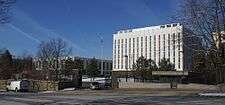
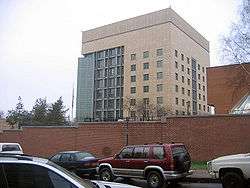
Russia–United States relations refers to the bilateral relationship between the United States and Russia. The United States and Russia maintain diplomatic and trade relations. The relationship was generally warm under the Russian President Boris Yeltsin (1991–99) until the NATO bombing of the Federal Republic of Yugoslavia[1][2] in the spring of 1999, and has since deteriorated significantly. In 2014, relations greatly strained due to the crisis in Ukraine, Russia's annexation of Crimea in 2014, differences regarding Russian military intervention in the Syrian Civil War, and from the end of 2016 over Russia's alleged interference in the 2016 U.S. elections. Mutual sanctions imposed in 2014 remain in place.
Country
| Common name | Russia | United States |
|---|---|---|
| Official name | Russian Federation, or Russia[3] | United States of America |
| Coat of arms |  |
.svg.png) |
| Flag |  |
 |
| Area | 17,125,191 km² (6,612,073 sq mi)
(including the Crimean Peninsula) |
9,833,520 km² (3,796,742 sq mi)[4] |
| Population | 127,835,000 | 327,908,413 |
| Population density | 8.3/km² (21.5/sq mi) | 33.7/km² (87.4/sq mi) |
| Capital | Moscow | Washington, D.C. |
| Largest metropolitan area | Moscow (~11,504,000) | New York City (~28,623,000) |
| Government | Federal semi-presidential republic | Federal presidential republic |
| First leader | Boris Yeltsin | George Washington |
| Current leader | Vladimir Putin | Donald Trump |
| Established | 25 December 1991 (Russian Federation formed) 26 December 1991 (Soviet Union dissolved) |
4 July 1776 (independence declared) 3 September 1783 (independence recognized) |
| Official languages | Russian | None at the federal level (English de facto) |
| Currency | Russian ruble | US dollar |
| GDP (nominal) | $1.745 trillion | $20.419 trillion |
| External debt (nominal) | $597.254 billion (2014 Q4) | $17.114 trillion (2014 Q4) |
| GDP (PPP) | $3.565 trillion | $20.435 trillion |
| GDP (nominal) per capita | $5,350 | $61,687 |
| GDP (PPP) per capita | $17,850 | $62,350 |
| Human Development Index | 0.700 (high) | 0.957 (very high) |
| Expatriates | ~7,450 Americans living in Russia (as of 2018[5]) | ~3,570,000 Russian Americans |
| Foreign exchange reserves | 465,228 (millions of USD) | 142,898 (millions of USD) |
| Military expenditures | $178.5 billion | $857.4 billion |
| Army size | Russian Army (2018)[6]
|
US Army (2018)[7]
|
| Navy size | Russian Navy (2018)[6]
Total naval strength: 352 ships
|
US Navy (2018)
Total naval strength: 415 ships
|
| Air Force size | Russian Air Force (2018)[6]
|
US Air Force (2018)[7]
|
| Nuclear warheads
active/total |
4,500 / 15,700 (2018) | 6,800 / 27,450 (2018)[8] |
| Economic alliance | BRICS, Eurasian Economic Union | Organisation for Economic Co-operation and Development |
| Military alliance | Collective Security Treaty Organization | NATO |
| Allies | Collective Security Treaty Organisation:
Other allies:
|
NATO:
Other allies:
|
Leaders of Russia and the United States from 1992

Background
United States and the Russian Empire
.jpg)
Official contacts between the Russian Empire and the new United States of America began in 1776. Russia, while formally neutral during the American Revolution (1765–1783), favored the U.S.
Fully-fledged diplomatic ties were established in 1809.[31] During the American Civil War (1861–1865), Russia supported the Union against the Confederacy which deterred the British from intervening. Russia sold its territory in North America, Alaska, to the United States in 1867. The Treaty of Portsmouth (1905), brokered by President Theodore Roosevelt ended the Russo-Japanese War.
From 1820 until 1917, about 3.3 million immigrants arrived in the U.S. from the Russian Empire. Most were Jews or Poles; only 100,000 were ethnic Russians.[32][33]
United States and Soviet Union
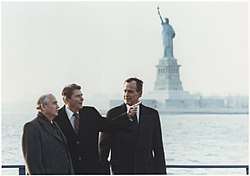
The U.S. participated in the allied military intervention against the Bolsheviks during the Russian Civil War since August 1918, operating in the Russian Far East. Following the Bolsheviks′ victory in the Civil War and the establishment of the Soviet Union (USSR) at the end of 1922, the U.S., while developing trade and economic ties, was the last major world power that continued to refuse to formally recognize the Soviet government.[34] The United States and the USSR established diplomatic relations in November 1933.
The United States and the Soviet Union were among the four major Allies against the Axis powers during World War II. Following the onset of the Cold War in 1947, the North Atlantic Treaty was signed by the U.S., Canada, and several Western European nations, in Washington, D.C. on 4 April 1949, a treaty that established the North Atlantic Treaty Organization (NATO) designed to provide collective security against the Soviet Union.[35]
The first bilateral treaty between the U.S. and Soviet Russia/USSR was a consular convention signed in Moscow in June 1964.[36][37] In 1975, the Helsinki Final Act was signed by a multitude of countries, including the USSR and the US, and, while not having a binding legal power of a treaty, it effectively signified the U.S.-led West′s recognition of the Soviet Union′s dominance in Eastern Europe and acceptance of the Soviet annexation of Estonia, Latvia and Lithuania that had been effected in 1940. The Act came to play a role in subsequently ending the Cold War.[38]
In the 1970s—1980s the USSR and the U.S. signed a series of arms control treaties such as the Anti-Ballistic Missile Treaty (1972), two Strategic Arms Limitation treaties (SALT), the Intermediate-Range Nuclear Forces Treaty (1987); in July 1991 the Strategic Arms Reduction Treaty was concluded.
In the late 1980s, Eastern European nations took advantage of the relaxation of Soviet control under Mikhail Gorbachev and began to break away from communist rule. The relationship greatly improved in the final years of the USSR.
On 3 December 1989, Gorbachev and the U.S. President George H. W. Bush declared the Cold War over at the Malta Summit.[39]
History
From dissolution of the Soviet Union through Yeltsin’s terms (1991–99)
On 25 December 1991, the Soviet Union dissolved, and the Commonwealth of Independent States, a loose association of the former USSR's constituent republics (except the Baltic states), was formed. The USSR's Russian Soviet Federative Socialist Republic became an independent state that inherited the USSR's UN Security Council permanent membership and declared itself the successor state to the USSR.
Relations between Russia and the U.S. remained generally warm under Russia's president Boris Yeltsin and the U.S. George H. W. Bush′s and then Bill Clinton's administrations in the 1990s. In 1993, the sides signed the START II arms control treaty that was designed to ban the use of multiple independently targetable reentry vehicles (MIRVs) on intercontinental ballistic missiles (ICBMs); the treaty was eventually ratified by both countries, yet it was never implemented and was formally abandoned in 2002, following the US′s withdrawal from the 1972 Anti-Ballistic Missile Treaty.
At the end of the 1990s, relations started to fray as Moscow grew suspicious about Washington′s intentions in the light of the first phase of the NATO eastward expansion.[40] Russia stridently opposed the U.S.-led NATO military operation against Serbia and Montenegro over Kosovo that began in late March 1999.[1][41][42] In December 1999, while on a visit to China, president Boris Yeltsin verbally assailed U.S. president Bill Clinton for criticizing Russia's tactics in Chechnya (at the start of the Second Chechen War) emphatically reminding that Russia remained a nuclear superpower and adding: ″Things will be as we have agreed with Jiang Zemin. We will be saying how to live, not [Bill Clinton] alone″.[40]
From Putin’s first term through end of George W. Bush’s second term (2000–09)
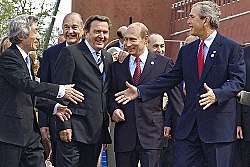
_and_submarine_tender_USS_Frank_Cable_(AS_40)_enjoy_a_song_performed_by_children_at_the_Parus_Nadezhdy_Children's_Rehabilitation_Center.jpg)
During the first presidencies of Vladimir Putin, who assumed the top office, first as acting president, on the last day of 1999, and United States president George W. Bush, the United States and Russia began to have serious disagreements. Under Putin, Russia became more assertive in international affairs; under Bush, the U.S. took an increasingly unilateral course in its foreign policy in the wake of the September 11 attacks.
The Russian leadership blamed U.S. officials for encouraging anti-Russian revolts during the Rose Revolution in Georgia in 2003 and the Orange Revolution in Ukraine a year later that were seen by the Putin administration as intrusions into Russia's geographic sphere of interest.[43]
Nevertheless, Putin and Bush were said to have established good personal relations.[44][45]
In 2002, the United States withdrew from the Anti-Ballistic Missile Treaty in order to move forward with plans for a missile defense system. Putin called the decision a mistake. Russia strongly opposed the 2003 invasion of Iraq, though without exercising its veto in the United Nations Security Council. Russia has regarded the expansion of NATO into the old Eastern Bloc, and U.S. efforts to gain access to Central Asian oil and natural gas as a potentially hostile encroachment on Russia's sphere of influence.
Controversy over U.S. plan to station missiles in Poland (2007-2008)
In March 2007, the U.S. announced plans to build an anti-ballistic missile defense installation in Poland along with a radar station in the Czech Republic. Both nations were former Warsaw Pact members. U.S. officials said that the system was intended to protect the United States and Europe from possible nuclear missile attacks by Iran or North Korea. Russia, however, viewed the new system as a potential threat and, in response, tested a long-range intercontinental ballistic missile, the RS-24, which it claimed could defeat any defense system. Vladimir Putin warned the U.S. that these new tensions could turn Europe into a "powder keg". On June 3, 2007, Putin warned that if the United States built the missile defense system, Russia would consider targeting missiles at Poland and the Czech Republic.[46]
In October 2007, Vladimir Putin visited Iran to discuss Russia's aid to Iran's nuclear power program and "insisted that the use of force was unacceptable."[47] On October 17, Bush stated "if you're interested in avoiding World War III, it seems like you ought to be interested in preventing them from having the knowledge necessary to make a nuclear weapon," understood as a message to Putin.[48] A week later Putin compared U.S. plans to put up a missile defense system near Russia's border as analogous to when the Soviet Union deployed missiles in Cuba, prompting the Cuban Missile Crisis.[49]
In February 2008, Vladimir Putin said Russia might have to retarget some of its missiles towards the missile defense system: "If it appears, we will be forced to respond appropriately – we will have to retarget part of our systems against those missiles." He also said that missiles might be redirected towards Ukraine if they went ahead with plans to build NATO bases within their territory, saying that "We will be compelled to aim our missiles at facilities that we consider a threat to our national security, and I am putting this plainly now so that the blame for this is not shifted later,"[50]
In July 2008, Russia announced that if a U.S. anti-missile shield was deployed near the Russian border, it would have to react militarily. The statement from the Russian foreign ministry said, "If an American strategic anti-missile shield starts to be deployed near our borders, we will be forced to react not in a diplomatic fashion but with military-technical means." Later, Russia's ambassador to the United Nations Vitaly Churkin said that "military-technical means" did not mean military action, but more likely a change in Russia's strategic posture, perhaps by redeploying its own missiles.[51]
On August 14, 2008, the U.S. and Poland agreed to have 10 two-stage missile interceptors – made by Orbital Sciences Corporation – placed in Poland, as part of a missile shield to defend Europe and the U.S. from a possible missile attack by Iran. In return, the U.S. agreed to move a battery of MIM-104 Patriot missiles to Poland. The missile battery was to be staffed – at least temporarily – by U.S. Military personnel. The U.S. also pledged to defend Poland, a NATO member, quicker than NATO would in the event of an attack. Additionally, the Czech Republic recently agreed to allow the placement of a radar-tracking station in their country, despite public opinion polls showing that the majority of Czechs were against the plans and only 18% supported it.[52] The radar-tracking station in the Czech Republic would also be part of the missile defense shield. After the agreement was announced, Russian officials said defences on Russia's borders would be increased and that they foresaw harm in bilateral relations with the United States.[53]
In November 2008, a day after Obama was elected president, Russian president Dmitry Medvedev in his first annual address to the Federal Assembly of Russia announced plans to deploy Iskander short-range missiles to Kaliningrad, near the border with Poland, if the United States went ahead with its European Ballistic Missile Defense System.[54][55]
Russian-Georgian clash (August, 2008)
In August 2008, United States-Russia bilateral relations became further strained, when Russia and Georgia fought a five-day war over the Russian-backed self-proclaimed republics of South Ossetia and Abkhazia.
From Obama’s first term to election of Trump (2009–16)
"Reset" under Obama and Medvedev (2009–11)
Despite U.S.–Russia relations becoming strained during the Bush administration, Russian president Dmitry Medvedev (president from May 2008 until May 2012, with Vladimir Putin as head of government) and U.S. president Barack Obama struck a warm tone at the 2009 G20 summit in London and released a joint statement that promised a "fresh start" in Russia–United States relations. The statement also called on Iran to abandon its nuclear program and to permit foreign inspectors into the country.[56]
In March 2009, U.S. Secretary of State Hillary Clinton and her Russian counterpart Sergey Lavrov symbolically pressed a "reset" button. The gag fell short as the Russian translation on the button was misspelt by the State Department and actually meant "overload" instead of "reset". After making a few jokes, they decided to press the button anyway.[57]
In early July 2009, Obama visited Moscow where he had meetings with president Medvedev and prime minister Putin. Speaking at the New Economic School Obama told a large gathering, "America wants a strong, peaceful and prosperous Russia. This belief is rooted in our respect for the Russian people, and a shared history between our nations that goes beyond competition."[58] Days after president Obama's visit to Moscow, U.S. vice president Joe Biden, noting that the U.S. was "vastly underestimat[ing] the hand that [it] h[e]ld", told a U.S. newspaper that Russia, with its population base shrinking and the economy "withering", would have to make accommodations to the West on a wide range of national-security issues.[59] Biden's words, published shortly after his visit to Ukraine and Georgia, were interpreted by George Friedman of Stratfor as "reaffirm[ing] the U.S. commitment to the principle that Russia does not have the right to a sphere of influence in these countries or anywhere in the former Soviet Union";[60] Friedman pointed up a fundamental error in the analysis that underlay such thinking and predicted, "We suspect the Russians will squeeze back hard before they move off the stage of history".[60]
In March 2010, the United States and Russia reached an agreement to reduce their stockpiles of nuclear weapons. The new nuclear arms reduction treaty (called New START) was signed by President Obama and President Medvedev on April 8, 2010. The agreement cut the number of long-range nuclear weapons held by each side to about 1,500, down from the current 1,700 to 2,200 set by the Moscow Treaty of 2002. The New START replaced the 1991 Strategic Arms Reduction Treaty, which expired in December 2009.[61]
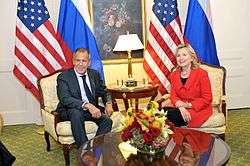
On a visit to Moscow in March 2011, U.S. vice president Joe Biden reiterated Washington's support for Russia's accession to the World Trade Organization;[62] he also had a meeting with Russia's leading human rights and opposition leaders where he reportedly told the gathering at the U.S. ambassador's Spaso House residence that it would be better for Russia if Putin did not run for re-election in 2012.[63]
At the start of the mass protests that began in Russia after the legislative election in early December 2011, prime minister Vladimir Putin accused the United States of interference and inciting unrest, specifically saying that secretary of state Hillary Clinton had sent "a signal" to "some actors in our country"; his comments were seen as indication of a breakdown in the Obama administration's effort to "reset" the relationship.[64]
By 2012, it was clear that a genuine reset never happened and relations remained sour. Factors in the West included traditional mistrust and fear, an increasing drift away from democracy by Russia, and a demand in Eastern Europe for closer political, economic and military integration with the West. From Russia factors included a move away from democracy by Putin, expectations of regaining superpower status and the tactic of manipulating trade policies and encouraging divisions within NATO.[65][66]
Start of Putin's third term. Obama's Syria "red line" (2012–2015)
Shortly after the election of Putin back to presidency in March 2012, the White House spokesman Jay Carney said United States–Russian cooperation was based on mutual interests.[67]
In mid-September 2013, the United States and Russia made a deal whereby Syria's chemical weapons would be placed under international control and eventually destroyed; president Obama welcomed the agreement[68] that was shortly after enshrined in the UNSC Resolution 2118. The Obama administration was criticised for having used the chemical weapons deal as an ineffectual substitute for military action that Obama had promised in the event of use of chemical weapons by the Syrian government.[69] In George Robertson's view, as well as many others', the failure of Obama to follow through on his 2013 "red line" and take promised military action badly hurt his credibility and that of the United States with Putin and other world leaders.[70][71]
Obama acknowledged Russia's role in securing the deal to limit Iran's nuclear program that was reached in July 2015, and personally thanked Putin for Russia's role in the relevant negotiations.[72]
On a personal level, the relationship between Obama and Putin went on to be characterised by an observer in 2015 the following way: "There can rarely have been two world leaders so obviously physically uncomfortable in one another's presence."[73]
Increased tension: Overview (2012–15)
In May 2012, Russian general Nikolay Yegorovich Makarov said that there was a possibility of a preemptive strike on missile defense sites in Eastern Europe, to apply pressure to the United States regarding Russia's demands.[74] In July 2012, two Tu-95 Bears were intercepted by NORAD fighters in the air defense zone off the U.S. coast of Alaska, where they may have been practicing the targeting of Fort Greely and Vandenberg Air Force Base.[75] Later in August 2012, it was revealed that an Akula-class submarine had conducted a patrol within the Gulf of Mexico without being detected, raising alarms of the U.S. Navy's anti-submarine warfare capabilities.[76][77]
On December 14, 2012, U.S. president Barack Obama signed the Magnitsky Act, which "[imposed] U.S. travel and financial restrictions on human rights abusers in Russia". On December 28, 2012, Russian President Vladimir Putin signed a bill, widely seen as retaliatory, that banned any United States citizen from adopting children from Russia.[78]
On February 12, 2013, hours before the 2013 State of the Union Address by U.S. President Obama, two Russian Tu-95 Bear strategic bombers, reportedly equipped with nuclear-tipped cruise missiles, circled the U.S. territory of Guam.[79][80] Air Force F-15 jets based on Andersen Air Force Base were scrambled to intercept the aircraft.[79][80] The Russian aircraft reportedly "were intercepted and left the area in a northbound direction."[79][80]
At the end of 2013, Russia announced that a rearmament of the Kozelsk, Novosibirsk, Tagil Rocket divisions with advanced RS-24 Yars intercontinental ballistic missiles was going ahead.[81]
In July 2014, the U.S. government formally accused Russia of having violated the 1987 Intermediate-Range Nuclear Forces (INF) Treaty by testing a prohibited medium-range ground-launched cruise missile (presumably R-500,[82] a modification of Iskander)[83] and threatened to retaliate accordingly.[83][84] Concern in the U.S. was also caused by the test-firing in 2014 of the Russian RS-26 Rubezh Intercontinental Ballistic Missile capable of evading the existing anti-ballistic missile defenses.[85][86]
In early June 2015, the U.S. State Department reported that Russia had failed to correct the violation of the I.N.F. Treaty; the U.S. government was said to have made no discernible headway in making Russia so much as acknowledge the compliance problem.[87]
Edward Snowden affair (2013-present)
.jpg)
Edward Snowden, a contractor for the United States government, copied and released hundreds of thousands of pages of secret U.S. government documents. He fled to Hong Kong, and then to Russia where in July 2013 he was granted political asylum. He was wanted on a criminal warrant by U.S. prosecutors for theft of government property and espionage.[88]
The granting of asylum further aggravated relations between the two countries and led to the cancellation of a meeting between Obama and Putin that was scheduled for early September 2013 in Moscow.[89] Snowden remains in Russia as of August 2018.
Ukraine crisis, sanctions (2014–present)
Following the collapse of the Viktor Yanukovych government in Ukraine in February 2014, Russia annexed Crimea on the basis of a controversial referendum held on March 16, 2014. The U.S. had submitted a UN Security Council resolution declaring the referendum illegal; it was vetoed by Russia on March 15 with China abstaining and the other 13 Security Council members voting for the resolution.[90] In 2016, in a court in Moscow, former top Ukrainian officials of the Yanukovich administration testified that the collapse of the government was, in their opinion, a coup d'état organized and sponsored by the U.S. government.[91][92] Russian newspaper Kommersant alleges George Friedman (chairman of Stratfor) had agreed this was the "most blatant coup in history', which George Friedman says was taken out of context.[93][94]
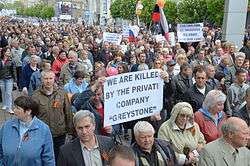
U.S. secretary of state John Kerry in early March 2014 answering the press questions about the Russia's moves in Crimea said, "This is an act of aggression that is completely trumped up in terms of its pretext. It's really 19th century behavior in the 21st century, and there is no way, to start with, that if Russia persists in this, that the G8 countries are going to assemble in Sochi. That's a starter."[71] On March 24, 2014, the U.S. and its allies in the G8 political forum suspended Russia's membership thereof.[95] The decision was dismissed by Russia as inconsequential.[96][97]
At the end of March 2014, U.S. president Obama ruled out any Western military intervention in Ukraine[96] and admitted that Russia's annexation of Crimea would be hard to reverse; however, he dismissed Russia as a "regional power" that did not pose a major security threat to the U.S.[98] In January 2016, when asked for his opinion of Obama's statement, Putin said, "I think that speculations about other countries, an attempt to speak disrespectfully about other countries is an attempt to prove one's exceptionalism by contrast. In my view, that is a misguided position."[99][100] In November 2016, the president of the European Commission Jean-Claude Juncker said this of the statement of Obama: "We have a lot to learn about the depths of Russia, we are very ignorant about it at the moment. I would like to have discussions on a level footing with Russia. Russia is not, as President Obama said, 'a regional power'. This was a big error in assessment."[101]
As unrest spread into eastern Ukraine in the spring of 2014, relations between the U.S. and Russia further worsened. The U.S. government imposed punitive sanctions for Russia's activity in Ukraine. After one bout of sanctions announced by President Obama in July 2014 targeting Russia's major energy, financial and defence companies, Russia said the sanctions would seriously harm the bilateral ties relegating them to the 1980s Cold War era.[102]
_02.jpg)
From March 2014 to 2016, six rounds of sanctions were imposed by the US, as well as by the EU, and some other countries allied to the U.S. The first three rounds targeted individuals close to Putin by freezing their assets and denying leave to enter. Russia responded by banning import of certain food products as well as by banning entry for certain government officials from the countries that imposed sanctions against Russia.
The end of 2014 saw the passage by the US of the Ukraine Freedom Support Act of 2014,[103][104] aimed at depriving certain Russian state firms of Western financing and technology while also providing $350 million in arms and military equipment to Ukraine, and the imposition by the US President's executive order of yet another round of sanctions.[105]
Due to the situation concerning Ukraine, relations between Russia and the U.S. that denounced Russia's actions were in 2014 said to be at their worst since the end of the Cold War.[106]
Russian military intervention in the Syrian Civil War (from September 30, 2015)
_04.jpg)
Shortly after the start of the Syrian Civil War in the spring of 2011, the U.S. imposed sanctions on Syria's government and urged president Bashar al-Assad to resign; meanwhile, Russia, a long-standing ally of Syria, continued and increased its support for the Syrian government against rebels backed up by the U.S. and its regional allies.
On September 30, 2015, Russia began the air campaign in Syria on the side of the Syrian government headed by president Bashar al-Assad of Syria. According to Russian foreign minister Sergey Lavrov's statement made in mid-October 2015, Russia had invited the U.S. to join the Baghdad-based information center set up by Iran, Iraq, Syria and Russia to coordinate their military efforts, but received what he called an "unconstructive" response; Putin's proposal that the U.S. receive a high-level Russian delegation and that a U.S. delegation arrive in Moscow to discuss co-operation in Syria was likewise declined by the U.S.[107][108][109]
In early October 2015, U.S. president Obama called the way Russia was conducting its military campaign in Syria a "recipe for disaster";[110] top U.S. military officials ruled out military cooperation with Russia in Syria.[111][112] Secretary of Defense Ashton Carter and other senior U.S. officials said Russia's campaign was primarily aimed at propping up Assad, whom U.S. president Barack Obama had repeatedly called upon to leave power.[113]
Three weeks into the Russian campaign in Syria, on October 20, 2015, Russian president Vladimir Putin met Bashar Assad in Moscow to discuss their joint military campaign and a future political settlement in Syria, according to the Kremlin report of the event.[114][115] The meeting provoked a sharp condemnation from the White House.[116]
While one of the original aims of the Russian leadership may have been normalisation of the relationship with the U.S. and the West at large, the resultant situation in Syria was said in October 2015 to be a proxy war between Russia and the U.S.[117][118][119][120][121] The two rounds of the Syria peace talks held in Vienna in October and November 2015, with Iran participating for the first time, highlighted yet again the deep disagreement over the Syrian settlement between the U.S. and Russia, primarily on the issue of Bashar Assad's political future.[122] The talks in Vienna were followed by a bilateral meeting of Obama and Putin on the sidelines of the G-20 Summit in Turkey, during which a certain consensus between the two leaders on Syria was reported to have been reached.[123][124]
.jpg)
Bilateral negotiations over Syria were unilaterally suspended by the U.S on October 3, 2016, which was presented as the U.S. government's reaction to a re-newed offensive on Aleppo by Syrian and Russian troops.[125] On the same day Putin signed a decree[126] that suspended the 2000 Plutonium Management and Disposition Agreement with the U.S. (the relevant law was signed on 31 October 2016[127]), citing the failure by the U.S. to comply with the provisions thereof as well as the U.S.' unfriendly actions that posed a "threat to strategic stability."[128][129] In mid-October 2016, Russia's U.N. ambassador Vitaly Churkin, referring to the international situation during the 1973 Arab–Israeli War, said that tensions with the U.S. are "probably the worst since 1973".[130] After two rounds of fruitless talks on Syria in Lausanne and London, the foreign ministers of the U.S. and the UK said that additional sanctions against both Russia and Syria were imminent unless Russia and the "Assad regime" stopped their air campaign in Aleppo.[131][132]
U.S. election of 2016
The U.S. presidential election campaign of 2016 saw the U.S. security officials accuse the Russian government of being behind massive cyber-hackings and leaks that aimed at influencing the election and discrediting the U.S. political system.[133] The allegations were dismissed by Putin who said the idea that Russia was favouring Donald Trump was a myth created by the Hillary Clinton campaign.[133] The background of tense relationship between Putin and Hillary Clinton was highlighted by U.S. press during the election campaign.[134] Trump had been widely seen as a pro-Russia candidate, with the FBI investigating alleged connections between Donald Trump's former campaign manager Paul Manafort as well as Carter Page and pro-Russian interests.[135]
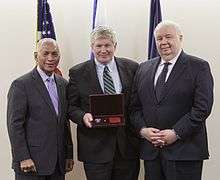
Between the 2016 election and Trump′s inauguration (November 8, 2016–January 20, 2017)
.jpg)
In mid-November 2016, shortly after the election of Donald Trump as the U.S. president, the Kremlin accused president Barack Obama's administration of trying to damage the U.S.' relationship with Russia to a degree that would render normalization thereof impossible for the incoming administration of Donald Trump.[136]
In his address to the Russian parliament delivered on December 1, 2016, Russian president Putin said this of U.S.—Russia relations: "We are prepared to cooperate with the new American administration. It's important to normalize and begin to develop bilateral relations on an equal and mutually beneficial basis. Mutual efforts by Russia and the United States in solving global and regional problems are in the interest of the entire world."[137]
In early December 2016, the White House said that President Obama had ordered the intelligence agencies to review evidence of Russian interference in the 2016 presidential campaign; Eric Schultz, the deputy White House press secretary, denied the review to be led by Director of National Intelligence James R. Clapper was meant to be "an effort to challenge the outcome of the election".[138] Simultaneously, the U.S. press published reports, with reference to senior administration officials, that U.S. intelligence agencies, specifically the CIA,[139] had concluded with "high confidence" that Russia acted covertly in the latter stages of the presidential campaign to harm Hillary Clinton's chances and promote Donald Trump.[140] President-elect Donald Trump rejected the CIA assessment that Russia was behind the hackers' efforts to sway the campaign in his favour as "ridiculous".[141][142]
In mid-December 2016, Hillary Clinton suggested that Putin had a personal grudge against her due to her criticism of the 2011 Russian legislative election and his opinion that she was responsible for fomenting the anti-Putin protests in Russia that began in December 2011.[143] She partially attributed her loss in the 2016 election to Russian meddling organized by Putin.[144][145]
Also in mid-December, President Obama publicly pledged to retaliate for Russian cyberattacks during the U.S. presidential election in order to "send a clear message to Russia" as both a punishment and a deterrent,;[146] however, the press reported that his actionable options were limited, with many of those having been rejected as either ineffective or too risky; The New York Times, citing a catalogue of U.S.-engineered coups in foreign countries, opined, "There is not much new in tampering with elections, except for the technical sophistication of the tools. For all the outrage voiced by Democrats and Republicans in the past week about the Russian action — with the notable exception of Mr. Trump, who has dismissed the intelligence findings as politically motivated — it is worth remembering that trying to manipulate elections is a well-honed American art form."[147]
The National Defense Authorization Act for Fiscal Year 2017 signed into law by president Obama on 23 December 2016, was criticised by the Russian foreign ministry as yet another attempt to "create problems for the incoming Trump administration and complicate its relations on the international stage, as well as to force it to adopt an anti-Russia policy."[148]
At the end of 2016, U.S. president-elect Donald Trump praised Russian president Vladimir Putin for not expelling U.S. diplomats in response to Washington's expulsion of 35 Russian diplomats as well as other punitive measures taken by the Obama administration in retaliation for what U.S. officials had characterized as interference in the U.S. presidential election.[149][150]
On January 6, 2017, the Office of the Director of National Intelligence (ODNI), in an assessment of “Russian Activities and Intentions in Recent US Elections”, asserted that Russian leadership favored presidential candidate Trump over Clinton, and that Russian president Vladimir Putin personally ordered an "influence campaign" to harm Clinton's chances and "undermine public faith in the US democratic process".[151]:7
From Trump’s inauguration to present (January 20, 2017–present)
2017
.jpg)
A week after the inauguration of Donald Trump on January 20, 2017, the U.S. President Donald Trump had a 50-minute telephone conversation with Russian President Vladimir Putin that was hailed by both governments as a step towards improvement of relations between the U.S. and Russia; the presidents agreed to arrange a face-to-face meeting for a later date.[152][153]
In early March 2017, the U.S. military for the first time publicly accused Russia of having deployed a land-based cruise missile (SSC-8[154]) that they said violated the "spirit and intent" of the 1987 Intermediate-range Nuclear Forces (INF) treaty and posed a threat to NATO.[155]
On March 25, 2017, the U.S. imposed new sanctions against eight Russian companies in connection with the Iran, North Korea, Syria Nonproliferation Act (INKSNA).[156]
The cruise-missile strikes on the Syrian Shayrat Airbase, conducted by the U.S. on 7 April 2017 as a response to the Khan Shaykhun chemical attack,[157][158][159] were condemned by Russia as an "act of aggression" that was based on a "trumped-up pretext", which substantially impaired Russia–United States relations.[160] Russian prime minister Dmitry Medvedev said the attack had placed the U.S. on the cusp of warfare with Russia.[161][162][163] Both Donald Trump in April and the Russian government in May characterised the relationship between the countries as frozen and lacking any progress;[164][165] in early June, Vladimir Putin said relations were at an all-time low since the end of the Cold War.[166] In mid-June 2017, the Russian foreign ministry confirmed that, for the first time ever, Russia had failed to receive a formal greeting from the U.S. government on occasion of Russia's national day celebrated on 12 June.[167][168][169][170]
.jpg)
In April 2017, Trump's administration denied a request from ExxonMobil to allow it to resume oil drilling in Russia.[171] In July 2017, ExxonMobil filed a lawsuit against the U.S. government challenging the finding that the company violated sanctions imposed on Russia.[172]
On May 10, 2017, Trump had an unannounced meeting in the Oval Office with Russian Foreign Minister Sergey Lavrov and Russian Ambassador to the United States Sergey Kislyak.[173] During the meeting he disclosed highly classified information, providing details that could have been used to deduce the source of the information and the manner in which it was collected, according to current and former government officials.[174][175] Although the disclosure was not illegal, it was widely criticized because of the possible danger to the source.[176][177]
On July 6, 2017, during a speech in Warsaw, Poland, Trump urged Russia to cease its support for "hostile regimes" in Syria and Iran.[178] On July 7, 2017, in what appeared to be a sign of good relations between the leaders of both countries,[179] Trump met with Putin at the G20 Hamburg summit in Germany and described the meeting as "an honour."[180]
In mid-July 2017, the Russian foreign ministry noted that the staff of the U.S. Embassy in Moscow, following expulsion of diplomats by the Obama administration in December 2016, far exceeded the number of Russian embassy employees in Washington and indicated that the Russian government was considering retaliatory expulsion of more than thirty-five U.S. diplomats, thus evening out the number of the countries' diplomats posted.[181] On July 28, Russia announced punitive measures that were cast as Russia's response to the additional, codified, sanctions against Moscow passed by Congress days prior, but also referenced the specific measures imposed against the Russian diplomatic mission in the U.S. by the Obama administration.[182] Russia demanded that the U.S. reduce its diplomatic and technical personnel in the Moscow embassy and its consulates in St Petersburg, Ekaterinburg and Vladivostok to four hundred fifty-five persons — the same as the number of Russian diplomats posted in the U.S. — by September 1; Russia’s government would also suspend the use of a retreat compound and a storage facility in Moscow used by the U.S. by August 1.[182][183][184] Two days later, Vladimir Putin said that the decision on the curtailment of the U.S. diplomatic mission personnel had been taken by him personally and that 755 staff must terminate their work in Russia.[185][186][187] After the sanction bill was on August 2 signed by Donald Trump, Russian prime minister Dmitry Medvedev wrote that the law had ended hope for improving U.S.–Russia relations and meant "an all-out trade war with Russia."[188][189] The law was also criticised by Donald Trump, whose signing statement indicated that he might choose not to enforce certain provisions of the legislation that he deemed unconstitutional.[190][191]
Russia protested on September 2, 2017, against a search it said U.S. officials were planning of a Russian trade mission building in Washington D.C., shortly after the U.S., ″in the spirit of parity invoked by the Russians″, demanded that Russia shut two of its diplomatic annexes (buildings) in Washington D.C. and New York City as well as its Consulate General in San Francisco.[192] The Russian foreign ministry said the inspection would be "illegal" and an "unprecedented aggressive action"; it also demanded that the U.S. ″immediately return the Russian diplomatic facilities″.[193][194][195]
.jpg)
In November 2017 Trump and Putin both attended the Asia-Pacific Economic Cooperation meeting in Danang. Although they had no formal meeting they spoke informally several times during the event.[196]
At the end of 2017, CNN concluded that a series of steps undertaken by the Trump administration within a mere week before Christmas such as naming Russia a "rival power" and ″revisionist power″ (along with China), imposing sanctions on Ramzan Kadyrov, a close Putin ally, the decision to provide Ukraine with anti-tank weapons, coupled with tougher line from the State Department about Moscow's activities in eastern Ukraine, and accusations from the Pentagon that Russia was intentionally violating de-confliction agreements in Syria, highlighted ″a decided turn away from the warmer, more cooperative relationship with Russia that President Donald Trump called for during his campaign and early in his presidency″.[197][198][199] In February 2018, echoing Donald Trump′s own statement, White House press secretary Sarah Sanders said: "[President Donald Trump] has been tougher on Russia in the first year than Obama was in eight years combined."[200][201]
2018
A highly unusual[202] unannounced visit to Washington D.C. at the end of January 2018 by the directors of Russia's three main intelligence and security agencies (FSB, SVR, and GRU), two of whom (Sergey Naryshkin and Igor Korobov) were on the U.S. sanctions list,[203] and their reported meetings with top U.S. security officials caused political controversy in the U.S. and elicited no official comment in Russia, while it occurred days before the Trump administration chose not to impose immediately new sanctions on Russia at the deadline mandated by the Countering America's Adversaries Through Sanctions Act.[204][205][206][207]
The U.S. air and artillery strike on a pro-government formation in eastern Syria on 7 February 2018, which caused massive death toll among Russian nationals and a political scandal in Russia, was billed by media as "the first deadly clash between citizens of Russia and the United States since the Cold War" and "an episode that threatens to deepen tensions with Moscow".[208][209]
Public statements read out by Vladimir Putin on 1 March 2018, days before the presidential election, about missile technology breakthroughs made by Russia, were referred to by the Trump administration officials as largely boastful untruths, as well as confirmation that "Russia ha[d] been developing destabilizing weapons systems for over a decade, in direct violation of its treaty obligations".[210] U.S. Defense Secretary James Mattis remarked that the systems Putin had talked about "[were] still years away" and he did not see them changing the military balance.[211] Nevertheless, White House insiders were later quoted as saying that Putin′s claims "really got under the president [Trump]'s skin" and caused Trump to take a sharper tone behind the scenes vis-à-vis Vladimir Putin.[212]
On 26 March 2018, following the United States National Security Council′s recommendation,[213] to demonstrate the U.S.'s support for the UK's position on the Salisbury poisoning incident, president Donald Trump ordered the expulsion of sixty Russian diplomats and closure of Russian consulate in Seattle.[214][215] Russian foreign minister Sergei Lavrov responded to the simultaneous expulsion of the total of 140 Russian diplomats by 25 countries by accusing the U.S. government of "blackmailing" other nations.[216][217]
.jpg)
In April 2018, US-Russian relations were further exacerbated by missile strikes against the Syrian government targets following the suspected chemical attack in Douma on 7 April.[218] The countries clashed diplomatically, with Russia′s top military officials threatening to hit U.S. military targets in the event of a massive U.S.-led strike against Syria.[219][220][221][222] In late May, during an interview with RT, Syria′s president Bashar al-Assad said that direct military conflict between the Russian forces and the U.S. forces in Syria had been averted in April "by the wisdom of the Russian leadership" and that the US-led missile attack against Syria would have been far more extensive had it not been for Russia′s intervention.[223][224][225]
On June 8, 2018, Trump called for Russia to be readmitted to the G-7, from which it was expelled after the Russian annexation of Crimea in 2014.[226]
Trump′s public statements during his first formal meeting with Putin in Helsinki on July 16, 2018, drew criticism from the Democratic members of the U.S. Congress and a number of former senior intelligence officials as well as some ranking members of the Republican party for appearing to have sided with Putin rather than accepting the findings of Russian interference in the 2016 presidential election issued by the United States Intelligence Community.[227][228][229] Republican Senator John McCain called the press conference "one of the most disgraceful performances by an American president in memory."[230] The press around the world ran publications that tended to assess the news conference following the presidents′ two-hour meeting as an event at which Trump had "projected weakness".[231]
Russian intelligence operations
Soviet Russia′s systemic espionage efforts in the U.S. began in the 1920s.
In April 2015, CNN reported that "Russian hackers" had "penetrated sensitive parts of the White House" computers in "recent months." It was said that the FBI, the Secret Service, and other U.S. intelligence agencies categorized the attacks "among the most sophisticated attacks ever launched against U.S. government systems."[232]
Mutual perceptions by the countries' populations
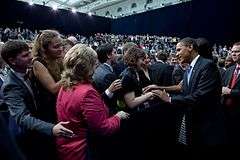
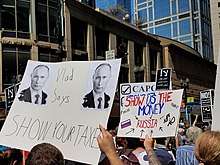
A poll by the University of Maryland, College Park, released early July 2009 found that only 2 percent of Russians had "a lot of confidence" that U.S. president Barack Obama would do the right thing in world affairs.[233] Russian media has criticized the United States over the past years for pursuing an anti-missile system in Europe, for favoring NATO expansion and for supporting Georgia in its armed conflict with Russia in 2008.[234]
Prior to 2014, the Russian press expressed varying opinions of Russia–United States relations.[235] Russian media treatment of America ranged from doctrinaire[236] and nationalistic[237] to very positive toward the United States and the West.[238][239][240][241] In 2013, 51 percent of Russians had a favorable view of the U.S., down from 57 percent in 2010.[242]
The opinion polls taken by the independent Levada Center in January 2015,[243] showed 81 percent of Russians tended to hold negative views of the U.S., a number that had nearly doubled over the previous 12 months and that was by far the highest negative rating since the center started tracking those views in 1988, as well as surpassing any time since the Stalin era, according to observers.[244] This contrasts with only 7 percent of Russians in April 1990 who said they had bad or somewhat bad attitudes towards the U.S.[245] Likewise, the figures published by Gallup in February 2015 showed a significant rise in anti-Russian sentiment in the U.S.: the proportion of Americans who considered Russia as a "critical military threat" had over the 12 months increased from 32 to 49 percent, and, for the first time in many years, Russia topped the list of America's perceived external enemies, ahead of North Korea, China and Iran, with 18 percent of U.S. residents putting Russia at the top of the list of the "United States' greatest enemy today".[246] Public opinion polls taken by the Pew Research Center showed that favorable U.S. public opinion of Russia was at 22 percent in 2015. The most negative view of Russia was at 19 percent in 2014, and the most positive view at 49 percent in 2010 and 2011.[247] The most negative view of the United States was at 15 percent in 2015, while the most positive view was at 61 percent in 2002.[248]
US public opinion regarding Russia has changed substantially over the past 25 years. A Gallup poll from 1992 to 2017 shows 62% of American respondents having a favorable view of Russia in 1992, and 29% having an unfavorable view. In 2017, 70% of American respondents had an unfavorable view of Russia, and 28% had a favorable view.[249]
A 2017 survey conducted by the Pew Research Center showed 41% of Russians had a positive view of the US, only one of two countries surveyed where positive perception for the US increased; 52% expressed a negative view.[250] The same study also showed 53% of Russians had confidence in the U.S. president Donald Trump, compared to just 11% for former president Barack Obama.[251]
There has also been a change in whether the Americans views Russia as an ally or a threat. In 1992, 44% of American respondents saw Russia to be friendly and not an ally, and 5% see them as a threat. In 2014, the Gallup poll reports that 21% of Americans see Russia as friendly but not an ally, and 24% of American respondents seeing them as a threat.[249] This difference in how Americans view Russia has been attributed to the increasing lack of cooperation in the scientific field between the US and Russia, by some.[252] Another perspective is the shift from ally to threat is due to the US being critical of Russia's aggression, especially with their aggression towards geographic neighbors.[253]
The 2016 surveys independently conducted by the Chicago Council and Russia′s Levada Center showed that mutual perceptions between Russians and Americans were at levels not seen since the Cold War, indicating considerable mutual distrust.[254]
U.S.-Russian relations have further deteriorated since 2016.[255] A December 2017 survey conducted by the Chicago Council and its Russian partner, the Levada Center, showed that:
Seventy-eight percent of Russians polled said the United States meddles “a great deal” or “a fair amount” in Russian politics, compared to 69 percent of Americans who say the same about Russian interference in U.S. politics. ... The poll found that 31 percent of Russians said Moscow tried to influence U.S. domestic affairs in a significant way, compared to 55 percent of Americans who felt that their own government tried to do the same thing in Russia. ... Only 31 percent of Americans say they hold a positive view of Russia, and 24 percent of Russians say the same of the United States. ... Eighty-one percent of Russians said they felt the United States was working to undermine Russia on the world stage; 77 percent of Americans said the same of Russia.[256]
Propaganda
- The U.S. government funds Radio Free Europe/Radio Liberty that broadcasts in Russian, Chechen and several other languages used in Russia. The radio's broadcasting is viewed by Russian researchers as an instrument of American propaganda targeting Russia as a state.[257]
- Russia funds RT ($307 million planned for 2016 for all channels) and Sputnik News, both of which are cited by the European Parliament's resolution of November 23, 2016, as the Russian government's tools of "propaganda against EU".[258] The RT network employs Americans, including prominent TV hosts and political commentators such as Larry King and Ed Schultz; it has RT America based in Washington, D.C.[259][260]
Timeline of relations between the United States and Russia
The timeline covers key events, 1991 to present.[261][262]
Yeltsin era, 1991–99
- 1991: U.S. President George H. W. Bush and USSR President Mikhail Gorbachev sign START I treaty, July 31.
- 1991: August: Soviet hardliners stage a coup against Gorbachev; they fail because of defiance by Russian President Boris Yeltsin. Communism collapses overnight in the USSR.
- 1991: Gorbachev announces the dissolution of the USSR into 15 independent republics; Russia is the successor state to USSR.
- 1992: Russian President Yeltsin visits the U.S. on January 26. He and Bush set up the United States-Russia Joint Commission on P.O.W./M.I.A.'s. Its mission is to discover what happened to POWs and those missing in action during the Cold War, as well as planes shot down, missing submarines. The committee had access to classified archives from the FBI and the KGB.[263]
- 1992: The Lisbon Protocol calls for the denuclearization of Ukraine, Belarus, Kazakhstan. May 23.[264]
- 1992: Russia attends the Washington Summit on June 16.
- 1992: The United States and Russia sign an Agreement Concerning Cooperation in the Exploration and Use of Outer Space for Peaceful Purposes on June 17.[265]
- 1993: Bush and Yeltsin sign the START II treaty in Moscow on January 3.[266]
- 1993: First summit meeting between U.S. President Bill Clinton and Yeltsin on April 4 in Vancouver, Canada, to discuss a new and expanded $1 billion aid package intended to support Russian democrats and to fund medical supplies, food and grain assistance as well as loans to Russian entrepreneurs.[267]
- 1993: The U.S. announces a bilateral aid program of $1.8 billion for Russia and the former Soviet republics on July 9 to 10.
- 1993: The U.S.-Russian Commission on technical cooperation in energy and space has its first meeting in Washington, D.C. on August 31 to September 2.
- 1994: Presidents Clinton and Yeltsin sign the Kremlin accords on January 14 in Moscow.
- 1994: First joint U.S.-Russia Space Shuttle mission on February 3.
- 1994: The United States and Russia move to end the practice of aiming their strategic nuclear missiles at each other on May 30.
- 1994: Russia joins the Partnership for Peace program on June 22.
- 1995: Presidents Clinton and Yeltsin hold a summit on European Security in Moscow on May 9 to May 10.
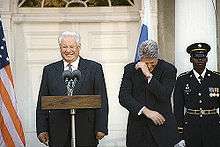 Boris Yeltsin and Bill Clinton share a laugh in October 1995.
Boris Yeltsin and Bill Clinton share a laugh in October 1995. - 1995: Russia joins the NATO-led IFOR in the aftermath of the Bosnian War on December 20.
- 1996: Ratification of START II treaty on January 26.
- 1996: Clinton and Yeltsin attend the Summit of the Peacemakers in Sharm al-Sheikh, Egypt to condemn the terrorist attacks in Israel and to declare their support for the Middle East peace process on March 14.
- 1996: Clinton attends a Summit on Nuclear Safety and Security with Yeltsin in Moscow on April 20.
- 1997: Russia joins the NATO-led Euro-Atlantic Partnership Council to cooperate on political and security issues on January 1.
- 1997: Clinton and Yeltsin hold another summit on European Security in Helsinki, Finland, on March 21. They reach some economic agreements, but there is continued disagreement on NATO expansion.
- 1997: April. Moscow summit with Chinese president Jiang Zemin disapproves of American world domination; agree to reduce troops along Russia-China border.[268]
- 1997: Russia attends the NATO summit in Paris, France, on May 27.
- 1997: The NATO-Russia Founding Act provides the formal basis of bilateral cooperation between the U.S., Russia and NATO is signed on May 27. Allows participation in NATO decision making; Russia agrees to drop opposition to NATO expansion in Central Europe.[269]
- 1997: Russia joins the G8 at the 23rd G8 summit in Denver, Colorado, on June 20 to June 22.[270]
- 1998: Clinton and Yeltsin agree to exchange information on missile launchings and to remove 50 metric tons of plutonium from their countries' nuclear weapons stocks in a summit in Moscow on September 1 to 2.
- 1999: Russia joins the NATO-led KFOR in the aftermath of the Kosovo War on June 12.
- 1999: March: Operation Allied Force: NATO bombing of Yugoslavia to force it out of Kosovo. Moscow attacked it as a breach of international law and a challenge to Russia's status in the Balkans.[271]
- 1999: Clinton and Yeltsin meet at an Organization for Security Cooperation in Europe Summit Meeting in Istanbul, Turkey, from November 18–19, to discuss arms control, Chechnya and events in Europe. Clinton remarks that the international community does not dispute Russia's right to defend its territorial integrity and to fight terrorism.[272]
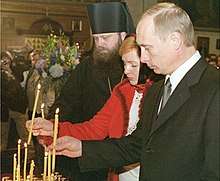
Putin era, 2000 to present
- 2000: Clinton visits Moscow to meet with new Russian President Vladimir Putin on June 3 to 5.
- 2000: Clinton and Putin meet at the United Nations Millennium Summit in New York City to call a plea for world peace on September 6.
- 2001: President George W. Bush has a very friendly meeting with Putin at the Slovenia summit on June 16. At the closing press conference, Bush said: "I looked the man in the eye. I found him very straightforward and trustworthy – I was able to get a sense of his soul." Bush's top security aide Condoleezza Rice realized that Bush's phrasing had been a serious mistake. "We were never able to escape the perception that the president had naïvely trusted Putin and then been betrayed."[273]
- 2001: Russia supports the U.S. in the aftermath of the September 11 attacks on September 12.[274]
- 2001: Russia opens a military hospital in Kabul, Afghanistan, to help the NATO military forces and Afghan civilians on December 2.
- 2002: Bush and Putin meet in Moscow and sign the Strategic Offensive Reductions Treaty and declaration on a new strategic relationship between the U.S. and Russia on May 24.[275]
- 2002: NATO and Russia create the NATO-Russia Council during Rome summit on May 28.[276]
- 2003: The "Roadmap for Peace" proposal developed by the U.S. in cooperation with Russia, the European Union, and the United Nations (the Quartet), was presented to Israel and the Palestinian Authority on April 30.[277]
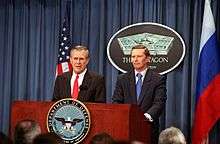 Donald Rumsfeld with Russian Minister of Defense Sergei Ivanov on March 13, 2002
Donald Rumsfeld with Russian Minister of Defense Sergei Ivanov on March 13, 2002 - 2004: Bush gives condolences to Putin in the aftermath of the Beslan school hostage crisis on September 21.
- 2006: Bush and Putin jointly announced the organization of the Global Initiative to Combat Nuclear Terrorism on July 16.[278]
- 2006: The U.S. and Russia condemn North Korea's first nuclear launch test on October 6.
- 2008: Russian President Dmitry Medvedev visits the U.S. for the first time at the 2008 G-20 summit in Washington D.C. from November 14 to November 15.
- 2009: February: US Vice President Joe Biden suggests the new Obama administration would like to "reset" America's relationship with Russia, which had deteriorated to its lowest point since the Cold War after Russia's war with Georgia in 2008.[279]
- 2009: Newly elected President Barack Obama and Medvedev meet for the first time at the G-20 Summit in London on April 1; they pledge to "deepen cooperation" on issues like nuclear terrorism.[280]
- 2009: The U.S. and Russia disapprove the nuclear test by North Korea on May 25.[281]
- 2009: Obama and Medvedev announce the Obama–Medvedev Commission to improve communication and cooperation between the U.S. and Russia in Moscow on July 6.
- 2009: U.S. Chairman of the Joint Chiefs of Staff Admiral Michael Mullen and Russian Chief of the General Staff Nikolay Makarov sign a new strategic framework for military-to-military engagement between the U.S. and Russia on July 7.
- 2009: Obama administration cancels the eastern European missile defense program denounced by Russian.[282]
- 2009: Russia agrees to allow U.S. and NATO troops and supplies to pass through Russia en route to Afghanistan on December 16.
- 2010: Obama and Medvedev sign New START treaty in Prague, Czech Republic, to replace the START I and it will eventually see the reduction of both nations' nuclear arsenals to 1,500 warheads for both the U.S. and Russia on April 8.
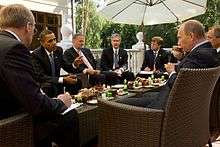 Barack Obama meets with Prime Minister Putin outside Moscow, July 7, 2009
Barack Obama meets with Prime Minister Putin outside Moscow, July 7, 2009 - 2010: The U.S. and Russia call for Iran to give up on its nuclear weapons program along with the United Kingdom, France and China on June 9.
- 2010. Obama and Medvedev sign the "New START" (New Strategic Arms Reduction Treaty). Goal is to reduce the deployed nuclear warheads on both sides by roughly 30 percent, down to 1,550. The treaty also limits the number of nuclear-armed submarines and bombers. New START went into force in February 2011.[280]
- 2010: The U.S. and Russia conduct a joint anti-hijacking exercise called Vigilant Eagle-2010 on August 14.
- 2010: Foreign ministers from the U.S., Russia and NATO meet in New York to discuss areas of cooperation like Afghanistan, fighting piracy and combatting terrorism as well as ways of enhancing security within Europe on September 22.
- 2010: Medvedev attends the 2010 NATO summit in Portugal, from November 19 to November 20. The U.S., Russia and NATO agree to cooperate on missile defense and other security issues as well as allowing more supplies for the U.S. and NATO to pass through Russia en route to Afghanistan as well as supplying Afghan armed forces with helicopters.
- 2011: The New START treaty is ratified in Munich, Germany, by U.S. Secretary of State Hillary Clinton and Russian Foreign Minister Sergey Lavrov on February 5.
- 2011: Ministers from the U.S., Russia and NATO meet in Berlin, Germany to discuss the situation in Libya and Afghanistan, as well as ongoing work on outlining the future framework for missile defence cooperation between the U.S., Russia and NATO on April 15.
- 2011: Russia congratulates the U.S. on the killing of Osama bin Laden on May 2.
- 2011–present: Syrian Civil War; the government receives technical, financial, military and political support from Russia, while the U.S. favors some of the rebels. Russia provides diplomatic support in the United Nations as well. Russia has an interest in a military presence in the region, and in suppressing its own Muslim militants. It also rejects regime change imposed by the West.[283]
- 2011: American, Russian and NATO ambassadors meet in Sochi, Russia, to restate their commitment to pursuing cooperation on missile defense as well as cooperation in other security areas of common interest on July 4.
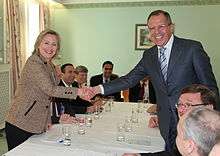 U.S. Secretary of State Hillary Clinton and Russian Foreign Minister Sergey Lavrov shake hands after signing the New START Treaty, Munich, Germany, on February 5, 2011
U.S. Secretary of State Hillary Clinton and Russian Foreign Minister Sergey Lavrov shake hands after signing the New START Treaty, Munich, Germany, on February 5, 2011 - 2011: American, Russian and NATO diplomats meet in New York to announce they have made progress in combating terrorism and enhancing Afghan transit on September 22.
- 2012: Russia agrees to host a U.S. and NATO transit hub at Ulyanovsk airport to help the U.S. and NATO withdrawal from Afghanistan in 2014 on March 21.
- 2012: Obama and Medvedev meet at the 2012 Nuclear Security Summit in Seoul to discuss the increase economic trade on March 26.
- 2012: The U.S., Russia and NATO hold missile defense exercises in Germany, from March 26 to March 30.
- 2012: American, Russian and NATO military forces agree to strengthen cooperation to counter piracy in the Horn of Africa on March 27.
- 2012: Russian Prime Minister Dmitry Medvedev attends the 38th G8 summit in Maryland, from May 18 to May 19.
- 2012: Russia joins the U.S. and NATO at the Chicago Summit on May 20.
- 2012: Obama and Putin meet at the 7th G-20 meeting in Los Cabos, Mexico, and call for an end to the Syrian civil war on June 18 to 19.
- 2012: American and Russian navies participate in the RIMPAC 2012 naval exercises from June 29 to August 3.
- 2012: Russia joins the WTO and begins trade with the U.S. on August 22.[284]
- 2013: Russia supports the U.S. against North Korea for North Korea building up tensions in the Korean peninsula and for threatening the U.S. during the crisis with North Korea on April 8.
- 2013: The U.S. and Russia agree to intensify their cooperation in countering terrorism, including information exchange between intelligence organizations and conduct joint counter-terrorist operations as well as signing a cyber security pact to reduce the risk of conflict in cyberspace and signing the New Anti-Proliferation Deal in order to protect, control and account for nuclear materials on June 17 during the 39th G8 summit.
 Obama at a bilateral meeting with Putin during the G8 summit in Ireland, June 17, 2013.
Obama at a bilateral meeting with Putin during the G8 summit in Ireland, June 17, 2013.
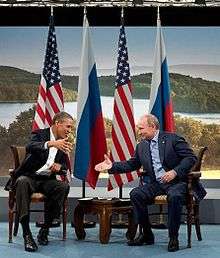
- 2013: Obama and Putin make progress on the discussion of Syria at the end of the 2013 G-20 summit in Saint Petersburg, Russia, on September 6.
- 2013 August 7. President Obama cancels an upcoming summit with Putin; journalists call it "a rare, deliberate snub that reflects the fresh damage done by the Edward Snowden case to an important relationship already in decline."[279]
- 2013: U.S. Secretary of State John Kerry and Russian Foreign Minister Sergey Lavrov meet in Geneva, Switzerland, and agree to secure and destroy Syria's chemical weapons on September 14.
- 2013: The U.S. and Russia along with the United Kingdom, France, China and Germany sign a deal with Iran about their nuclear program in Geneva, Switzerland, on November 27.
- 2014: The Geneva II Conference
- 2014: The U.S. Olympics team arrives in Sochi, Russia, to participate in the 2014 Winter Olympics on January 30.
- 2014 - Continuing. see Russian military intervention in Ukraine (2014–present)
- 2014: The U.S. and Russia along with the European Union and Ukraine talk in Geneva about the crisis in Ukraine and reach an agreement to end the crisis on April 17.
- 2014: The U.S. and Russia start sending aid to Iraq to help fight ISIS on June 5.
- 2015: The U.S. and Russia along with members of the European Union and Ukraine welcome the new Minsk agreement to stop the War in Donbass on February 12.
- 2015: The U.S. and Russia agree to build a new space station to replace the International Space Station and to make a joint project to travel to Mars on March 28.
- 2015: The U.S. and Russia along with the United Kingdom, France, China, Germany, the European Union and Iran sign the Joint Comprehensive Plan of Action to regulate Iran's nuclear program in Vienna, Austria on July 14.
- 2015: The U.S. and Russia reach an agreement on a UN resolution that would designate accountability for use of chemical weapons in Syria on August 6.
- 2015: The U.S. and Russia resume military relations to increase fighting against the Islamic State on September 18.
- 2015: Obama and Putin meet in New York to discuss ways to combat the Islamic State on September 28–29.
- 2015: The U.S. and Russia sign a deal to avoid air incidents over Syria on October 20.
- 2015: Obama and Putin have an informal bilateral meeting on the sidelines of the G-20 Summit in Turkey to discuss the situation in Syria and the ramifications of the Paris attacks on November 15.
- 2015: The U.S., Russia and the United Nations hold three way talks on Syria in Geneva, Switzerland on December 11.
- 2015: The U.S. and Russia, along with the United Nations approve a resolution that supports international efforts to seek a solution to end the Syrian Civil War and provide a new government in Syria in Vienna, Austria on December 18.
- 2016 June: A debate opens inside the Republican Party on future American policy toward Russia. The presumptive presidential nominee Donald Trump has suggested that US and Russia might work together in areas such as Syria. Meanwhile, on June 9, Republican leaders in Congress urged confronting Putin, alleging that he is exhibiting "burgeoning militarism" and calling for "standing up to Russian aggression and bolstering countries such as Ukraine."[285]
- 2016 November: Donald Trump wins the US Presidential Election.
- 2017 April: According to Trump, US ties with Russia may be at all-time low following US missile strike on Syria.[286]
- 2017 July: During a speech in Warsaw, Poland, Trump warned Russia to stop its "destabilizing" actions in Ukraine and elsewhere, and its support for "hostile regimes" such as those in Syria and Iran. He also urged Russia to "join the community of responsible nations".[287]
.jpg) U.S. President Donald Trump, Russian President Vladimir Putin, Rex Tillerson, and Sergey Lavrov at the G20 Hamburg summit, July 7, 2017
U.S. President Donald Trump, Russian President Vladimir Putin, Rex Tillerson, and Sergey Lavrov at the G20 Hamburg summit, July 7, 2017 - 2017 July: Trump and Putin held a meeting for more than a two-hour period at the G20 Summit in Hamburg. Secretary of State Rex Tillerson said that Trump brought up discussion about Russia's alleged interference in the 2016 US Presidential election.[288]
- 2018 July 16, Russia–United States summit between Trump and Putin took place in Helsinki, Finland. Topics of discussion included the situation in Syria, the Ukrainian crisis and nuclear arms control.[289]
Space exploration
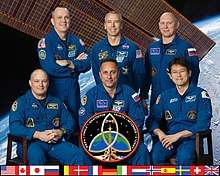
The Planetary Society is known to have collaborated with Russia, especially Cosmos 1 and LIFE.
In 2014, NASA renewed a contract to ferry U.S. astronauts to the International Space Station on Soyuz rockets and spacecraft. Including additional support at the Russian launch site, this contract is costing the United States $457.9 million. Along with the renewal, NASA also announced that they would be cutting some contacts with Russia after the annexation of Crimea.[290]
Economic ties
The U.S. Congress voted to repeal the Jackson–Vanik amendment on November 16, 2012.[291]
"Last year [2015] was not particularly favorable for trade between Russia and the U.S. Our overall 2015 turnover was $21 billion, a decline of 27.9 percent," said a senior Russian official in April 2016.[292]
Military ties
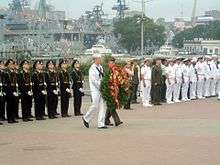
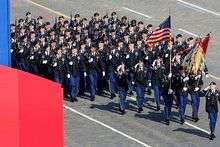
Following the demise of the Soviet Union, the United States and Russia signed a bilateral treaty called the Strategic Arms Reduction Treaty (START II), signed by George H. W. Bush and Boris Yeltsin.
The United States and Russia have conducted joint military maneuvers, training and counter-terrorist exercises in Germany. This was done in hopes to strengthen relations with the United States and Russia.[293] The Russian president has also proposed that the United States and Russia put a joint missile defense system in Azerbaijan, a proposal being considered by the United States.[294] In 2008, in response to tensions over Georgia, the United States had cancelled its most recent joint NATO-Russia military exercises.
As of August 2012, the U.S. and Russia continue to hold joint military exercises like Northern Eagle (held since 2004, together with Norway)[295][296][297] and Vigilant/Watchful Eagle (with Canada)[298] among others, with the aim of improving joint cooperation against terrorism and piracy.
NATO–Russia relations
Russia-U.S. relations are significantly influenced by the United States' leading role in NATO and policies thereof. NATO and Russia agreed to cooperate on security issues at the 2002 Rome summit and had been gradually improving relations. However, due to the expansion of the alliance, the Russian intervention in Georgia, Russia's war campaign against Ukraine and other controversies, relations have since deteriorated significantly.[299]
In May 2015, following increased tensions with NATO, Russia closed a key military transport corridor (the Northern Distribution Network), which had allowed NATO to deliver military supplies to Afghanistan through the Russian territory.[300] The Northern Distribution Network was established in 2009 in response to the increased risk of sending supplies through Pakistan.[301]
A June 2016 Levada poll found that 68% of Russians think that deploying NATO troops in the Baltic states and Poland – former Eastern bloc countries bordering Russia – is a threat to Russia.[302]
Joint operations and mutual support
Russia has expressed support for the United States' War on Terror. Russia has also agreed to provide logistic support for the United States forces in Afghanistan to aid in anti-terrorist operations. Russia has allowed U.S. and NATO forces to pass through its territory to go to Afghanistan.[300]
Gallery
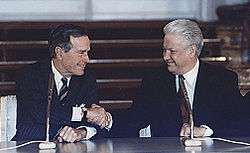 U.S. President George H. W. Bush with Russian President Boris Yeltsin in 1993.
U.S. President George H. W. Bush with Russian President Boris Yeltsin in 1993.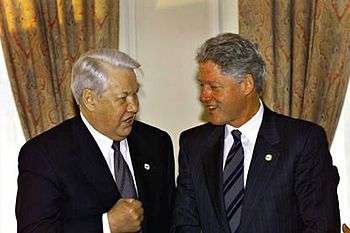 U.S. President Bill Clinton with Russian President Boris Yeltsin in 1999.
U.S. President Bill Clinton with Russian President Boris Yeltsin in 1999.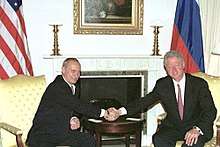 U.S. President Bill Clinton with Russian President Vladimir Putin in 2000.
U.S. President Bill Clinton with Russian President Vladimir Putin in 2000.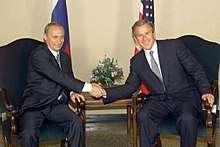 U.S. President George W. Bush with Russian President Vladimir Putin in 2001.
U.S. President George W. Bush with Russian President Vladimir Putin in 2001.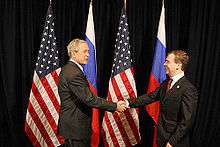 U.S. President George W. Bush with Russian President Dmitry Medvedev in 2008.
U.S. President George W. Bush with Russian President Dmitry Medvedev in 2008.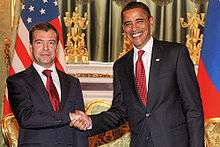 U.S. President Barack Obama with Russian President Dmitry Medvedev in 2009.
U.S. President Barack Obama with Russian President Dmitry Medvedev in 2009._01.jpg) U.S. President Barack Obama with Russian President Vladimir Putin in 2015.
U.S. President Barack Obama with Russian President Vladimir Putin in 2015..jpg) U.S. President Donald Trump and Russian President Vladimir Putin in 2017.
U.S. President Donald Trump and Russian President Vladimir Putin in 2017.
See also
References
- 1 2 Реакция России на предстоящую военную операцию НАТО оказалась беспрецедентно резкой Archived March 4, 2016, at the Wayback Machine. Gazeta.ru, 24 March 1999.
- ↑ Владимир Путин ответил на вопросы журналистов: Глава государства ответил на вопросы российских журналистов по завершении саммита БРИКС. kremlin.ru, 16 October 2016: ″Вопрос: Отношения с Америкой расстроились по сирийскому вопросу… — В.Путин: Вы ошибаетесь. Вы вспомните, что происходило вокруг Югославии. Оттуда всё и началось, я ещё и президентом не был. Я, что ли, развернул самолёт над Атлантикой? Это, по‑моему, Примаков сделал.″
- ↑ Глава 1. Основы конституционного строя Archived May 5, 2016, at the Wayback Machine. Article 1 of the Constitution of Russia: "ARTICLE 1: 1. The Russian Federation - Russia is a democratic federative law-governed state with a republican form of government. 2. The names Russian Federation and Russia are equivalent."
- ↑ Gopnik, Adam (2018). "United States". Encyclopædia Britannica online. Retrieved July 28, 2016.
- ↑ Bertrand, Eva (20 December 2012). "US citizens moving to Russia - interview". Sputnik News. The Voice of Russia.
- 1 2 3 "Russia Military Strength".
- 1 2 "United States of America Military Strength".
- ↑ New START Treaty Aggregate Numbers of Strategic Offensive Arms
- 1 2 International recognition of Abkhazia and South Ossetia
- ↑ Bolivia–Russia relations
- 1 2 3 4 ALBA
- ↑ Foro de São Paulo
- ↑ Burundian unrest (2015-present)
- ↑ https://www.rbth.com/international/2015/05/07/russia_and_cambodia_re-establish_warm_ties_45793.html
- ↑ https://southfront.org/china-offers-russia-an-alliance-against-nato-what-will-be-moscows-response/
- ↑ Cuba–Russia relations
- 1 2 3 Russia–Syria–Iran–Iraq coalition
- ↑ Internal conflict in Myanmar
- ↑ https://www.yahoo.com/news/russia-un-accuses-us-destructive-meddling-nicaragua-180110028.html
- ↑ http://www.foxnews.com/world/2018/08/30/russia-holds-up-release-report-on-north-korea-sanctions.html
- ↑ http://www.sudantribune.com/spip.php?article64661
- ↑ War in Darfur
- ↑ Syrian Civil War
- ↑ http://www.slate.com/articles/news_and_politics/roads/2014/05/transnistria_putin_and_ukraine_a_pro_russian_breakaway_region_that_doesn.html
- ↑ https://sputniknews.com/politics/201703201051761613-russia-uzbekistan-putin/
- ↑ Crisis in Venezuela
- ↑ http://thebricspost.com/china-russia-helping-zimbabwe-ride-out-wests-bullying/#.W5chBS2-J0c
- 1 2 3 4 5 6 7 8 9 10 11 12 13 14 15 16 17 18 19 20 21 22 23 24 Major non-NATO ally
- 1 2 3 4 5 European Union Member
- ↑ International recognition of Kosovo
- ↑ "Россия установила дипломатические отношения с США".
- ↑ John Powell (2009). Encyclopedia of North American Immigration. Infobase. pp. 257–59.
- ↑ Русские трудовые эмигранты в США (конец XIX века – 1917 год)
- ↑ Признание Америки Radio Liberty, 30 April 2018.
- ↑ North Atlantic Treaty Organization (NATO), 1949 U.S. Department of State.
- ↑ Luman H. Long. 1968 Centennial Edition. The World Almanac and Book of Facts. Newspaper Enterprise Association, Inc., N.Y., N.Y., p. 532.
- ↑ Консульская конвенция между Правительством Союза Советских Социалистических Республик и Правительством Соединенных Штатов Америки
- ↑ "Milestones: 1969–76 - Office of the Historian". history.state.gov. Retrieved 2018-02-09.
- ↑ Malta summit ends Cold War, BBC News, 3 December 1989. Retrieved 11 June 2008.
- 1 2 Michael Laris (10 December 1999). "In China, Yeltsin Lashes Out at Clinton: Criticisms of Chechen War Are Met With Blunt Reminder of Russian Nuclear Power". The Washington Post. p. A35.
- ↑ "Russia condemns Nato at UN". BBC News. 1999-03-25.
- ↑ "Fighting for a foreign land". BBC News. 1999-05-20.
- ↑ Mazzetti, Mark; Eric Lichtblau (December 11, 2016). "C.I.A. Judgment on Russia Built on Swell of Evidence". The New York Times. Retrieved December 14, 2016.
- ↑ "Bush and Putin: Best of friends". BBC. June 16, 2001. Retrieved October 23, 2015.
- ↑ Heritage, Timothy (August 8, 2013). "In wishing Bush well, Putin has message for Obama". Reuters. Retrieved July 26, 2016.
- ↑ Gottemoeller, Rose (June 5, 2007). "Strained Russian Relations Greet Bush in Europe". NPR (Interview). Interviewed by Robert Siegel. Retrieved July 26, 2016.
- ↑ Halpin, Tony (October 17, 2007). "Vladimir Putin pledges to complete Iranian nuclear reactor". The Times. Retrieved April 2, 2010.
- ↑ "White House Transcript of 17 October 2007 Press Conference". October 17, 2007.
- ↑ "Putin compares US shield to Cuba". BBC News. October 26, 2007. Retrieved April 2, 2010.
- ↑ "Russia could aim rockets at European missile shield – Putin". RIA Novosti. February 14, 2008. Archived from the original on February 17, 2008. Retrieved April 2, 2010.
- ↑ "Russia warns over US-Czech shield". BBC News. July 8, 2008. Retrieved April 2, 2010.
- ↑ "No permanent foreign inspectors in US-Czech radar talks: minister". spacedaily.com. May 11, 2008. Retrieved August 8, 2008.
- ↑ Andrusz, Katya (August 15, 2008). "Poland Gets U.S. Military Aid in Missile-Shield Deal". Bloomberg.com. Archived from the original on October 22, 2012. Retrieved April 3, 2010.
- ↑ Leslie, Neil. "The Kaliningrad Missile Crisis". Retrieved December 14, 2016.
- ↑ "Russia to deploy missiles in Kaliningrad to counter US threat". Xinhua News Agency. November 6, 2008. Retrieved April 2, 2010.
- ↑ Cooper, Helene (April 1, 2009). "Promises of 'Fresh Start' for U.S.-Russia Relations". The New York Times. Retrieved July 28, 2016. (Subscription required (help)).
- ↑ "U.S.-Russia Relations: In Need of a New Reset". Time. March 16, 2010. Archived from the original on March 21, 2014. Retrieved May 23, 2010.
- ↑ "Obama: U.S. wants strong, peaceful Russia". CNN. July 7, 2009. Retrieved October 28, 2016.
- ↑ Spiegel, Peter (July 25, 2009). "Biden Says Weakened Russia Will Bend to U.S." The Wall Street Journal. Retrieved October 28, 2016.
- 1 2 Friedman, George (July 27, 2009). "The Russian Economy and Russian Power". Stratfor. Retrieved October 28, 2016.
- ↑ Baker, Peter; Ellen Barry (March 24, 2010). "Russia and U.S. Report Breakthrough on Arms". The New York Times. Retrieved July 28, 2016. (Subscription required (help)).
- ↑ U.S. Vice President Meets Putin, Russian Opposition 10 March 2011.
- ↑ Biden 'Opposes' 3rd Putin Term The Moscow Times, 11 March 2011.
- ↑ Herszenhorn, David M.; Ellen Barry (December 8, 2011). "Putin Contends Clinton Incited Unrest Over Vote". The New York Times. Retrieved December 14, 2016.
- ↑ Braun, Aurel (2012). "Resetting Russian–Eastern European relations for the 21st century". Communist and Post-Communist Studies. 45 (3–4): 389–400. doi:10.1016/j.postcomstud.2012.07.009. ISSN 0967-067X.
- ↑ Ratti, Luca (2013). "'Resetting' NATO–Russia Relations: A Realist Appraisal Two Decades after the USSR". The Journal of Slavic Military Studies. 26 (2): 141–161. doi:10.1080/13518046.2013.779845. ISSN 1351-8046.
- ↑ "U.S.-Russia Cooperation Based on Interests - White House". RIA Novosti. March 9, 2012. Archived from the original on May 25, 2013.
- ↑ Obama welcomes Syria chemical weapons deal but retains strikes option The Guardian, September 14, 2013.
- ↑ Obama's biggest achievement in Syria fell short — and Assad is rubbing it in his face Business Insider, August 28, 2016.
- ↑ "Europeans View Obama's Exit With a Mix of Admiration and Regret". The New York Times. November 6, 2016.
- 1 2 Interview With David Gregory of NBC's Meet the Press March 2, 2014.
- ↑ Russia's Stake in Iran Nuclear Deal VOA, July 18, 2015.
- ↑ The awkward moment when Barack Obama and Vladimir Putin met at the UN General Assembly Telegraph, September 29, 2015.
- ↑ Heintz, Jim; Liudas Dapkus (May 3, 2012). "Russia's military threatens pre-emptive strike if NATO goes ahead with missile plan". Fox News. Associated Press. Archived from the original on May 4, 2012. Retrieved August 27, 2012.
- ↑ Gertz, Bill (August 6, 2012). "Putin's July 4th Message:Russian nuclear-capable bombers intercepted near West Coast in second U.S. air defense zone intrusion in two weeks". The Washington Free Beacon. Archived from the original on July 10, 2015. Retrieved August 27, 2012.
- ↑ Gertz, Bill (August 14, 2012). "Silent Running". Free Beacon. Retrieved July 28, 2016.
- ↑ Richard Dunham (August 16, 2012). "Red October redux? John Cornyn demands answers from Pentagon on Russian sub in Gulf of Mexico (UPDATED)". Houston Chronicle. Hearst Communications Inc. Retrieved August 27, 2012.
- ↑ "Russia's Putin signs anti-U.S. adoption bill". CNN News Network.
- 1 2 3 Gertz, Bill (February 15, 2013). "Bear Bombers Over Guam". Washington Free Beacon. Retrieved February 20, 2013.
- 1 2 3 "Air Force confirms Russian jets circled US territory of Guam". Fox News. February 16, 2013. Retrieved February 20, 2013.
- ↑ Bayanihan. Science and Technology. December 27, 2013. Putin: Russia begins deployment of new silo-based missile system December 27, 2013.
- ↑ "Russian INF Treaty Violations: Assessment and Response". Retrieved April 22, 2016.
- 1 2 Gordon, Michael R. (July 28, 2014). "U.S. Says Russia Tested Cruise Missile, Violating Treaty". The New York Times. USA. Retrieved January 4, 2015.
- ↑ "US and Russia in danger of returning to era of nuclear rivalry". The Guardian. UK. January 4, 2015. Retrieved January 4, 2015.
- ↑ Испытания новой МБР завершатся в декабре Rossiyskaya Gazeta, December 27, 2014.
- ↑ Убийца ПРО «Рубеж» выходит на позиции: последнее предупреждение США TV Zvezda, April 27, 2015.
- ↑ Gordon, Michael R. (June 5, 2015). "U.S. Says Russia Failed to Correct Violation of Landmark 1987 Arms Control Deal". The New York Times. US. Retrieved June 7, 2015.
- ↑ Suné von Solms and Renier van Heerden. "The Consequences of Edward Snowden NSA Related Information Disclosures." Iccws 2015-The Proceedings of the 10th International Conference on Cyber Warfare and Security (2015) online.
- ↑ Sanchez, Raf (August 7, 2013). "Barack Obama cancels meeting with Vladimir Putin over Edward Snowden". The Daily Telegraph. London.
- ↑ UN Security Council action on Crimea referendum blocked UN web site.
- ↑ Экс-премьер Украины Азаров назвал "кураторов" переворота на Украине RIA Novosti, 16 December 2016.
- ↑ новостей, Независимое бюро. "Независимое бюро новостей - Суд в РФ по "перевороту" в Украине допросил Азарова, Клюева, Захарченко и Якименко".
- ↑ ""Интересы РФ и США в отношении Украины несовместимы друг с другом": Глава Stratfor Джордж Фридман о первопричинах украинского кризиса". Kommersant. December 19, 2014.
- ↑ "George Friedman: Russia is winning the internet". Business Insider. April 21, 2016.
- ↑ "Russia Is Ousted From Group of 8 by U.S. and Allies". The New York Times. Retrieved March 25, 2014.
- 1 2 "U.S., other powers kick Russia out of G8". CNN.com. March 24, 2014. Retrieved March 25, 2014.
- ↑ "Russia Suspended From G8 Club Of Rich Countries". Business Insider. March 24, 2014.
- ↑ "Barack Obama: Russia is a regional power showing weakness over Ukraine". The Guardian. March 25, 2014. Retrieved November 1, 2014.
- ↑ Интервью немецкому изданию Bild. Часть 2 Kremlin.Ru, January 12, 2016.
- ↑ Interfax (January 12, 2016). "Putin disagrees with Obama over Russia's regional status, US exceptionalism".
- ↑ "Exclusive Interview with European Commission President Jean-Claude Juncker". Euronews. Retrieved November 26, 2016.
- ↑ "Russia warns new US sanctions will return ties to Cold War era". Russia News.Net. Archived from the original on July 29, 2014. Retrieved July 18, 2014.
- ↑ Statement by the President on the Ukraine Freedom Support Act, December 18, 2014.
- ↑ Baker, Peter (December 16, 2014). "Obama Signals Support for New U.S. Sanctions to Pressure Russian Economy". New York Times. Retrieved December 25, 2014.
- ↑ "Ukraine crisis: Russia defies fresh Western sanctions". BBC. December 20, 2014. Retrieved December 25, 2014.
- ↑ Koren, Marina (December 31, 2014). "How 2014 Became the Worst Year in U.S.-Russia Relations Since the Cold War". National Journal. Archived from the original on January 1, 2015. Retrieved February 25, 2015.
- ↑ "Russia's Lavrov says Washington declines deeper military talks on Syria". NEWSru. Retrieved October 17, 2015.
- ↑ "US refuses to receive PM Medvedev's delegation to coordinate anti-terrorist actions in Syria". RT English. Retrieved October 16, 2015.
- ↑ ""Это обидно": Лавров сообщил, что США отказались принять делегацию РФ для обсуждения сирийского кризиса". NEWSru. Retrieved October 16, 2015.
- ↑ "US president's comments follow coalition's expression of deep concerns over targeting in Russian bombing campaign". The Guardian. October 2, 2015. Retrieved October 23, 2015.
- ↑ "As Russia escalates, U.S. rules out military cooperation in Syria". Reuters. October 7, 2015. Retrieved October 9, 2015.
- ↑ "Russia will pay price for Syrian airstrikes, says US defence secretary". The Guardian. October 8, 2015.
- ↑ "Russians Strike Targets in Syria, but Not ISIS Areas". The New York Times. September 30, 2015. Retrieved October 9, 2015.
- ↑ "Meeting with President of Syria Bashar Assad". The Kremlin, Moscow. October 21, 2015. Retrieved July 26, 2016.
- ↑ "Assad Makes Unannounced Trip to Moscow to Discuss Syria With Putin". The New York Times. October 21, 2015.
- ↑ "Syria crisis: US attacks Moscow welcome for Assad". BBC. October 22, 2015. Retrieved October 23, 2015.
- ↑ "U.S. Weaponry Is Turning Syria Into Proxy War With Russia". The New York Times. October 12, 2015. Retrieved October 14, 2015.
- ↑ Pengelly, Martin (October 4, 2015). "John McCain says US is engaged in proxy war with Russia in Syria". The Guardian. Archived from the original on October 12, 2015. Retrieved October 17, 2015.
- ↑ "U.S., Russia escalate involvement in Syria". CNN. October 13, 2015. Retrieved October 17, 2015.
- ↑ ""The Russians have made a serious mistake": how Putin's Syria gambit will backfire". The VOA. October 1, 2015. Retrieved October 17, 2015.
- ↑ Simon Shuster (October 12, 2015). "Putin's Syria Gamble". Time. Retrieved October 23, 2015.
- ↑ "Сирийское урегулирование продвинулось не дальше Башара Асада". Kommersant. November 16, 2015. Retrieved November 16, 2015.
- ↑ "G20: Barack Obama and Vladimir Putin agree to Syrian-led transition", The Guardian, November 16, 2015.
- ↑ Chorley, Matt (November 16, 2015). "Putin comes in from the cold: Desperate world leaders cosy up to Russian President to get him to join the fight against ISIS". The Daily Mail. Archived from the original on November 16, 2015.
- ↑ Gordon, Michael R.; Kramer, Andrew E. (October 3, 2016). "Tension With Russia Rises as U.S. Halts Syria Negotiations". The New York Times. ISSN 0362-4331. Retrieved October 4, 2016.
- ↑ "Официальный интернет-портал правовой информации". Retrieved December 14, 2016.
- ↑ "Путин подписал закон о приостановлении действия соглашения с США об утилизации плутония". Retrieved December 14, 2016.
- ↑ "Putin Halts Plutonium Pact, Demands End to Sanctions by U.S." Bloomberg. October 3, 2016. Retrieved October 15, 2016.
- ↑ Kramer, Andrew E. (October 3, 2016). "Vladimir Putin Exits Nuclear Security Pact, Citing 'Hostile Actions' by U.S." The New York Times. ISSN 0362-4331. Retrieved October 4, 2016.
- ↑ "Russia's United Nations Ambassador: Tensions with US are probably worst since 1973". The Independent. October 15, 2016. Retrieved October 15, 2016.
- ↑ "Syria conflict: West considers new sanctions over Aleppo". BBC. October 16, 2016. Retrieved October 16, 2016.
- ↑ Cockburn, Harry (October 17, 2016). "UK and US propose economic sanctions against Russia over 'barbaric siege' of Aleppo". The Independent. Retrieved December 12, 2016.
- 1 2 "US election: The Russia factor: Officials say Moscow's interference is unprecedented. Has the Kremlin achieved its goal?". The FT. November 4, 2016.
- ↑ "Russia, Suspected in Hacking, Has Uneasy History With Hillary Clinton". The New York Times. July 28, 2016. Retrieved December 14, 2016.
- ↑ Kentish, Ben (November 1, 2016). "FBI 'looking into former Trump campaign manager's Russian ties'". The Independent. Retrieved December 12, 2016.
- ↑ "Kremlin: Obama team trying to damage ties with Russia". The Washington Post. November 17, 2016.
- ↑ "Послание Президента Федеральному Собранию". Retrieved December 14, 2016.
- ↑ "Barack Obama orders 'full review' of possible Russian hacking in US election". The Guardian. December 9, 2016.
- ↑ "Trump, CIA on collision course over Russia's role in U.S. election". The Washington Post. December 10, 2016.
- ↑ "Russia 'intervened to promote Trump' - US intelligence". BBC. December 10, 2016.
- ↑ "Donald Trump rejects CIA Russia hacking report". BBC. December 11, 2016.
- ↑ "Donald Trump's transition team dismisses CIA findings Russia attempted to influence US election in his favour". The Independent. December 10, 2016.
- ↑ Chozick, Amy (December 17, 2016), "Clinton Says 'Personal Beef' by Putin Led to Hacking Attacks", The New York Times, p. A12, retrieved December 17, 2016
- ↑ Abdullah, Halimah (December 16, 2016), "Hillary Clinton Singles Out Putin, Comey in Election Loss", NBC News, retrieved December 17, 2016
- ↑ Keith, Tamara (December 16, 2016), "In Leaked Remarks, Hillary Clinton Explains Putin's 'Beef' With Her", National Public Radio, retrieved December 17, 2016
- ↑ "Barack Obama promises retaliation against Russia over hacking during US election". The Guardian. December 16, 2016.
- ↑ "Obama Confronts Complexity of Using a Mighty Cyberarsenal Against Russia". The New York Times. December 17, 2016.
- ↑ Comment by Foreign Ministry Spokesperson Maria Zakharova on new US National Defence Authorisation Act 27 December 2016.
- ↑ Russia-US row: Trump praises Putin amid hacking expulsions BBC, 31 December 2016.
- ↑ Obama administration announces measures to punish Russia for 2016 election interference The Washington Post, 29 December 2016.
- ↑ Feldman, Brian (January 6, 2017). "DNI Report: High Confidence Russia Interfered With U.S. Election". nymag.com. Retrieved October 6, 2017.
- ↑ "Donald Trump and Vladimir Putin ready to hold summit following historic phone call". The Telegraph. January 28, 2017.
- ↑ "Trump and Putin make counter-terror top priority in first call". BBC. January 28, 2017.
- ↑ Majumdar, Dave. "Russia's Dangerous Nuclear Forces are Back". The National Interest.
- ↑ U.S. general says Russia deploys cruise missile, threatens NATO Reuters, 8 March 2017.
- ↑ Sputnik. "US Imposes Sanctions Against 8 Russian Companies – US State Department".
- ↑ "Statement from Pentagon Spokesman Capt. Jeff Davis on U.S. strike in S" (Press release). U.S. Department of Defense. Retrieved 7 April 2017.
- ↑ Starr, Barbara; Diamond, Jeremy (6 April 2017). "Trump launches military strike against Syria". CNN. Archived from the original on 7 April 2017. Retrieved 7 April 2017.
- ↑ "Syria war: US launches missile strikes following chemical 'attack'". BBC News. 7 April 2017. Archived from the original on 7 April 2017. Retrieved 7 April 2017.
- ↑ Robinson, Julian. "Putin calls US strikes against Syria 'aggression against sovereign country'". TASS. Retrieved 7 April 2017.
- ↑ Morello and Filipov (April 11, 2017). "Tillerson brings tough line to Moscow over Russia's backing for Syrian regime". Washington Post. Retrieved 2017-04-11.
- ↑ Медведев объявил, что разгромом военной базы в Сирии США поставили себя "на грань боевых столкновений с Россией" NEWSru, 7 April 2017.
- ↑ "Russia says US air strikes in Syria came 'within an inch' of military clash with their forces". The Independent. Retrieved 7 April 2017.
- ↑ Moscow, Julian Borger Alec Luhn in (April 13, 2017). "Donald Trump says US relations with Russia 'may be at all-time low'" – via The Guardian.
- ↑ Отношения России и США застыли не только в сфере политики, считает Ушаков RIA Novosti, 31 May 2017.
- ↑ Путин назвал отношения России и США худшими со времен холодной войны RIA Novosti, 2 June 2017.
- ↑ США впервые не направили в посольство РФ поздравление с Днем России Rossiyskaya Gazeta, 13 June 2017.
- ↑ Захарова: США не передавали официального поздравления с Днем России Vedomosti, 15 June 2017.
- ↑ Захарова: Москва так и не получила от Вашингтона поздравление с Днем России TASS, 15 June 2017.
- ↑ "Spineless Trump First POTUS Not to Congratulate Russian Holiday in 25 Years". June 14, 2017.
- ↑ "The Trump administration has denied ExxonMobil permission to bypass sanctions to drill for oil in Russia". CNN. April 21, 2017.
- ↑ "Exxon Mobil Sues U.S. Over Penalty For Post-Sanctions Russian Deal". Radio Free Europe/Radio Liberty (RFE/RL). July 20, 2017.
- ↑ Hirschfeld Davis, Julie (May 10, 2017). "Trump Bars U.S. Press, but Not Russia's, at Meeting With Russian Officials". New York Times.
- ↑ Rosenberg, Matthew; Schmitt, Eric (May 15, 2017). "Trump Revealed Highly Classified Intelligence to Russia, in Break With Ally, Officials Say". The New York Times. p. A1.
- ↑ Miller, Greg; Jaffe, Greg. "Trump revealed highly classified information to Russian foreign minister and ambassador". The Washington Post. Retrieved May 15, 2017.
- ↑ Pegues, Jeff (May 16, 2017). "Former officials call Trump's disclosure 'serious'". CBS News. Retrieved May 16, 2017.
- ↑ Dalrymple, Jim, II; Leopold, Jason (May 15, 2017). "Trump Revealed Highly Classified Information To Russians During White House Visit". BuzzFeed. Retrieved May 16, 2017.
- ↑ Wilner, Michael (6 July 2017). "Trump Calls on Putin to Distance Russia from Syria and Iran". The Jerusalem Post. Retrieved 26 July 2017.
- ↑ Cassidy, John (7 July 2017). "The Trump-Putin Bromance is Back On". The New Yorker. Retrieved 26 July 2017.
- ↑ Sampathkumar, Mythili (7 July 2017). "Donald Trump's meeting with Vladimir Putin lasts more than 2 hours after being scheduled for 30 minutes". The Independent. Retrieved 26 July 2017.
- ↑ Nechepurenko, Ivan (14 July 2017). "Russia Warns U.S. It Could Expel Americans Over Diplomatic Dispute". The New York Times. Retrieved 18 July 2017.
- 1 2 Заявление Министерства иностранных дел Российской Федерации Russian Foreign Ministry, 28 July 2017.
- ↑ Russia expels US diplomats in tit-for-tat over sanctions FT, 28 July 2017.
- ↑ Американским дипломатам закрыли дачный сезон Kommersant, 28 July 2017.
- ↑ "Putin asks US to cut its embassy and consulate staff in Russia by 755". Delhi NYOOOZ. Retrieved 31 July 2017.
- ↑ Putin confirms 755 US diplomatic staff must leave BBC, 30 July 2017.
- ↑ Эксклюзивное интервью Владимира Путина: почему ответ России чувствителен для США Vesti.ru, 30 July 2017.
- ↑ "Russia's Medvedev Says U.S. Sanctions Bill Ends Hope For Better Ties". RadioFreeEurope/RadioLiberty.
- ↑ Медведев: ужесточением санкций США объявили России полноценную торговую войну TASS, 2 August 2017.
- ↑ Trump Signs Russian Sanctions Into Law, With Caveats The New York Times, 2 August 2017
- ↑ Statement by President Donald J. Trump on the Signing of H.R. 3364 The White House, 2 August 2017
- ↑ "Achieving Parity in Diplomatic Missions". state.gov. U.S. Department of State. August 31, 2017. Retrieved 2 September 2017.
- ↑ Russia condemns US 'plans' to search Washington trade mission BBC, 2 September 2017.
- ↑ ‘Occupation’ of Russian diplomatic properties in US ‘blunt act of hostility’ – Foreign Ministry Rt, 3 September 2017.
- ↑ Statement of the Ministry of Foreign Affairs of the Russian Federation mid.ru, 3 September 2017.
- ↑ Merica, Dan (November 11, 2018). "Trump, Putin shake hands, chat multiple times at Asia-Pacific summit". CNN. Retrieved 17 June 2018.
- ↑ Despite Trump's hopes, US-Russia relations are getting chilly CNN, 24 December 2017.
- ↑ Treasury adds five to Russian sanctions list that has infuriated the Kremlin CNBC, 20 December 2017.
- ↑ Trump: Russia and China ‘rival powers’ in new security plan BBC, 18 December 2017.
- ↑ Sarah Sanders cryptically hints at action against Russia CNN, 20 February 2018.
- ↑ Trump’s ‘tougher on Russia’ claim fits a pattern of striving to one-up Obama The Washington Post, 20 February 2018.
- ↑ Chiefs Of Three Russian Intelligence Agencies Travel To Washington Radio Liberty, 1 February 2018.
- ↑ US suspends sanctions against Russian security chiefs during their visit to Washington TASS, 2 February 2018.
- ↑ Russian spy chiefs met in Washington with CIA director to discuss counterterrorism The Washington Post, 31 January 2018.
- ↑ «Визит Нарышкина касается национальных интересов США» Gazeta.ru, 2 February 2018.
- ↑ Why the Directors of Russia’s Intelligence Agencies Visited Washington (Op-ed): Secret meetings between the U.S. and Russia are the best hope for restoring relations The Moscow Times, 8 February 2018.
- ↑ CIA defends meeting with Russian spy officials, in letter to Schumer Fox News, 1 February 2018.
- ↑ White House Considers Citing Russian Deaths in Syria as Sign of U.S. Resolve Bloomberg, 21 February 2018.
- ↑ Russian mercenary boss spoke with Kremlin before attacking US forces in Syria, intel claims The Telegraph, 23 February 2018.
- ↑ Putin claims new 'invincible' missile can pierce US defenses CNN, 1 March 2018.
- ↑ Mattis Sees No Change in Russian Military Capability in Light of Putin’s Speech U.S. Department of Defense, 11 March 2018.
- ↑ Trump tells aides not to talk publicly about Russia policy moves: But Trump, irked by Putin's nuclear buildup, told him last week: "If you want to have an arms race we can do that, but I'll win." NBC News, 29 March 2018.
- ↑ CNN, Michelle Kosinski,. "Trump's National Security Council recommends expelling Russian diplomats". CNN. Retrieved 2018-03-24.
- ↑ Rucker, Philip; Nakashima, Ellen (2018-03-26). "Trump administration expels 60 Russian officers, shuts Seattle consulate in response to attack on former spy in Britain". Washington Post. ISSN 0190-8286. Retrieved 2018-03-26.
- ↑ США высылают из страны 60 российских дипломатов TASS, 26 March 2018.
- ↑ Lavrov: 'Rest assured, Russia won't tolerate' West’s obnoxious conduct TASS, 27 March 2018.
- ↑ Лавров обвинил США в колоссальном шантаже европейских стран Rossiyskaya Gazeta, 27 March 2018.
- ↑ Majumdar, David (11 April 2018). "Tensions Are Flaring between Washington and Moscow". The National Interest. Retrieved 11 April 2018.
- ↑ U.S., Russia clash at U.N. over chemical weapons attacks in Syria Reuters, 9 April 2018.
- ↑ Russian officials warn of possible military clash with US over Syria The Guardian, 10 April 2018.
- ↑ Россия нацелила "Калибры" на базы США в Сирии: Вооруженные силы РФ скрытно приведены в полную боеготовность Nezavisimaya Gazeta, 11 April 2018.
- ↑ "America vows to respond to a suspected chemical attack in Syria". The Economist. 9 April 2018. Retrieved 10 April 2018.
- ↑ Assad tells US to leave Syria CNN, 31 May 2018.
- ↑ Assad raises prospect of clashes with U.S. forces in Syria Reuters, 31 May 2018.
- ↑ ‘We were close to direct conflict between Russia & US inside Syria’ – Bashar Assad RT EXCLUSIVE, 31 May 2018.
- ↑ DeYoung, Karen (June 9, 2018). "In Trump, some fear the end of the world order". The Washington Post. Retrieved 9 June 2018.
- ↑ Zurcher, Anthony (16 July 2018). "Trump-Putin summit: After Helsinki, the fallout at home". BBC News. BBC News Services. Retrieved 18 July 2018.
- ↑ Calamur, Krishnadev (July 16, 2018). "Trump Sides With the Kremlin, Against the U.S. Government". The Atlantic. Retrieved 18 July 2018.
- ↑ Trump Hails Summit With Putin, Stirs Anger In Congress Radio Liberty, 16 July 2018.
- ↑ "John McCain: Trump gave 'one of the most disgraceful performances by an American president in memory'".
- ↑ 'Putin's poodle:' Newspapers around the world react to Trump-Putin meeting CNN, 17 July 2018.
- ↑ Evan Perez; Shimon Prokupecz (8 April 2015). "How the U.S. thinks Russians hacked the White House". CNN. Retrieved 17 December 2016.
Russian hackers behind the damaging cyber intrusion of the State Department in recent months used that perch to penetrate sensitive parts of the White House computer system, according to U.S. officials briefed on the investigation.
- ↑ "Obama agrees arms cuts, Afghan transit with Russia". Reuters. July 6, 2009. Archived from the original on March 5, 2016. Retrieved April 2, 2010.
- ↑ Stott, Michael (July 6, 2009). "Chilly welcome awaits Obama in Russia". Reuters. Archived from the original on December 10, 2013. Retrieved April 2, 2010.
- ↑ Gavrov, Sergei (2013-04-30). "US Still Has a Chance". Vzglyad, Russia. Retrieved 2013-04-30.
- ↑ Orlov, Dmitriy (2009-07-31). "Truman and Churchill No Better Than Stalin". Izvestia. Retrieved 2010-04-02.
- ↑ Trostnikov, Victor (2009-01-21). "Obama Presidency Marks End of Western Civilization". Argumenty i Fakty. Retrieved 2010-04-02.
- ↑ Novoprudski, Semen (2009-10-17). "Russia's Elite Must Embrace New Era with U.S." Gazeta.ru. Retrieved 2010-04-02.
- ↑ Golz, Alexander (2009-09-18). "Shall Russians Praise or Curse 'Those Treacherous Yankees'?". Yezhednevniy Zhurnal, Russia. Retrieved 2010-04-02.
- ↑ Markedonov, Sergey (2009-10-19). "Russians Shouldn't Be Happy About America's Afghan Misfortune". Kommersant. Retrieved 2010-04-02.
- ↑ "Obama: The Color of Change for Both Russia and Europe". Vedomosti. 2008-11-06. Retrieved 2010-04-02.
- ↑ "Opinion of the United States". Pew Research Center.
- ↑ "Opinions in Russia". Washington Post. March 8, 2015. Retrieved July 26, 2016.
- ↑ Birnbaum, Michael (March 8, 2015). "Russia's anti-American fever goes beyond the Soviet era's". The Washington Post. Retrieved July 27, 2016. (Subscription required (help)).
- ↑ "Anti-American Sentiment on the Rise in Russia". The Wall Street Journal. June 5, 2014.
- ↑ "Americans Increasingly See Russia as Threat, Top U.S. Enemy". Gallup. February 16, 2015.
- ↑ "Global Indicators Database: Opinion of Russia". Pew Research Center. 2015. Retrieved July 26, 2016.
- ↑ "Global Indicators Database: Opinion of the United States". Pew Research Center. 2015. Retrieved July 26, 2016.
- 1 2 Inc., Gallup,. "Russia". Gallup.com. Retrieved 2017-11-02.
- ↑ Wike, Richard; Stokes, Bruce; Poushter, Jacob; Fetterolf, Janell (June 26, 2017). "1. The tarnished American brand".
- ↑ U.S. Image Suffers as Publics Around World Question Trump’s Leadership Pew Research Center, 26 June 2017.
- ↑ Campbell, Cathleen A. (2014-06-20). "Warming U.S.-Russia relations". Science. 344 (6190): 1323–1323. doi:10.1126/science.1257373. ISSN 0036-8075. PMID 24948710.
- ↑ Rice, Condoleezza (October 2008). "US-Russia Relations". Hampton Roads International Security Quarterly – via Proquest.
- ↑ Affairs, Chicago Council on Global (4 November 2016). "US and Russia: Insecurity and Mistrust Shape Mutual Perceptions | Chicago Council on Global Affairs". www.thechicagocouncil.org.
- ↑ "US-Russia relations fail to improve in Trump's first year and they are likely to get worse". The Independent. 19 January 2018.
- ↑ "More Russians are sure of the U.S. meddling in their politics than the other way around, poll finds". The Washington Post. 7 February 2018.
- ↑ Якунин В. И.; Багдасарян В. Э.; Сулакшин С. С. (2013). Новые технологии борьбы с российской государственностью: монография (PDF). М.: Научный эксперт. , pp. 282-283
- ↑ "MEPs sound alarm on anti-EU propaganda from Russia and Islamist terrorist groups - News - European Parliament". Retrieved December 14, 2016.
- ↑ Rutenberg, Jim (September 18, 2016). "Larry King, the Russian Media and a Partisan Landscape" – via NYTimes.com.
- ↑ Kramer, Andrew E (August 22, 2010). "Russian Cable Station Plays to U.S." The New York Times.
- ↑ Angela E. Stent, The Limits of Partnership: U.S. Russian Relations in the Twenty-First Century (2014), pp 282-93.
- ↑ "Chronology of Important Events" online from U. S. government
- ↑ James Brooke, "Decades Later, Tales of Americans in Soviet Jails," New York Times July 19, 1996
- ↑ Marco De Andreis; Francesco Calogero (1995). The Soviet Nuclear Weapon Legacy. p. 12.
- ↑ Jinyuan Su, "Use of Outer Space for Peaceful Purposes: Non-Militarization, Non-Aggression and Prevention of Weaponization." Journal of Space Law 36 (2010): 253+.
- ↑ American President: A Reference Resource. Foreign Affairs. George H.W.Bush Front Page. Miller Center. University of Virginia. History. Policy. Impact. Retrieved February 6, 2014.
- ↑ T. L. Friedman (April 1993) SUMMIT IN VANCOUVER; CLINTON PRESENTS BILLION TO YELTSIN IN U.S. AID PACKAGE The New York Times Archives. Retrieved February 6, 2014.
- ↑ "China, Russia sign pact: Yeltsin and Jiang Oppose any single world power," CNN April 23, 1997
- ↑ J. L. Black, Russia faces NATO expansion: bearing gifts or bearing arms? (2000).
- ↑ Kovatch Jr, William J. (Winter 1998). "Comments: Joining the Club: Assessing Russia's Application for Accession to the World Trade Organization" (PDF). Temple Law Review. 71: 3. Retrieved July 26, 2016.
- ↑ Averre, Derek (2009). "From Pristina to Tskhinvali: the legacy of Operation Allied Force in Russia's relations with the West". International Affairs. 85 (3): 575–591. doi:10.1111/j.1468-2346.2009.00815.x. ISSN 0020-5850. JSTOR 27695032.
- ↑ Bill Clinton, Boris Yeltsin, and U.S.-Russian Relations Milestones: 1993-2000. U.S. Department of State. Office of the Historian. Retrieved February 6, 2014.
- ↑ Condoleezza Rice (2011). No Higher Honour. p. xxx.
- ↑ Anatole Lieven, "The secret policemen's ball: the United States, Russia and the international order after 11 September." International Affairs 78#2 (2002): 245-259.
- ↑ George W. Bush, "Letter of transmittal and article-by-article analysis of the treaty on strategic offensive reductions." Arms Control Today 32#6 (2002): 28.
- ↑ Julianne Smith, The NATO-Russia relationship: defining moment or déjà vu? (CSIS, 2008).
- ↑ Daniel Mandel, "Four-Part Disharmony: The Quartet Maps Peace." Middle East Quarterly (Summer 2003), pp. 15-27 online
- ↑ Riccardo Alcaro, "The Global Initiative to Combat Nuclear Terrorism: Big Potential, Limited Impact?." International Spectator 44#1 (2009): 99-112.
- 1 2 Brad Plumer, "A short timeline of deteriorating U.S.-Russia relations," Washington Post August 8, 2013
- 1 2 Plumer, "A short timeline of deteriorating U.S.-Russia relations," Washington Post August 8, 2013
- ↑ Seung‐Ho Joo, "Moscow–Pyongyang Relations under Kim Jong‐il: High Hopes and Sober Reality" Pacific Focus 24.1 (2009): 107-130.
- ↑ Mankoff, Jeffrey (2012). "The politics of US missile defence cooperation with Europe and Russia". International Affairs. 88 (2): 329–347. doi:10.1111/j.1468-2346.2012.01074.x. ISSN 0020-5850.
- ↑ Roy Allison, "Russia and Syria: explaining alignment with a regime in crisis." International Affairs 89.4 (2013): 795-823.
- ↑ Stephen K. Wegren, "The Impact of WTO Accession on Russia's Agriculture." Post-Soviet Affairs 28.3 (2012): 296-318.
- ↑ Damian Paletta, "House GOP Plan Differs From Donald Trump on Foreign Policy: One notable departure is the lawmakers' hard line on Vladimir Putin, whom Trump has praised" The Wall Street Journal June 9, 2016
- ↑ "Donald Trump says US relations with Russia 'may be at all-time low'". The Guardian. 12 April 2017.
- ↑ "Trump tells Russia to stop 'destabilising' Ukraine". BBC News. 6 July 2017.
- ↑ Merica, Dan; Liptak, Kevin (7 July 2017). "US, Russia disagree over what Trump and Putin actually said to each other". CNN.
- ↑ https://www.bbc.com/news/world-europe-44852812
- ↑ Zezima, Katie (April 18, 2014). "Despite sanctions, Russia is getting a $457.9M check from NASA". Washington Post. Retrieved July 26, 2016. (Subscription required (help)).
- ↑ Englund, Will (November 17, 2012). "Russia chafes as House passes Magnitsky Act". The Washington Post. Retrieved July 27, 2016. (Subscription required (help)).
- ↑ Lydia Tomkiw, "Russia Economy 2016: No GDP Growth Expected Amid Low Oil Prices, Sanctions, Government Officials Admit" IBT April 21, 2016
- ↑ "Russia, US to Hold Joint Military Exercises in Germany". Moscow News. July 20, 2007. Archived from the original on October 15, 2007. Retrieved April 2, 2010.
- ↑ "U.S./Russia: Missile Expert Assesses Azerbaijan Radar Proposal". Radio Free Europe/Radio Liberty. June 8, 2007. Archived from the original on June 10, 2007. Retrieved April 2, 2010.
- ↑ "Eagles get ready to attack". Radio The Voice of Russia. August 23, 2012. Retrieved August 26, 2012.
- ↑ "U.S. participates in joint naval drills". United Press International. August 22, 2012. Retrieved August 26, 2012.
- ↑ "Russia, U.S., Norway to Hold Joint Naval Drills in August". Ria Novosti. August 24, 2012. Archived from the original on May 27, 2012. Retrieved August 26, 2012.
- ↑ "Russian military to take part in anti-terror exercise in N. America". Radio The Voice of Russia. August 24, 2012. Retrieved August 26, 2012.
- ↑ Forsberg, Tuomas; Herd, Graeme (2015). "Russia and NATO: From Windows of Opportunities to Closed Doors". Journal of Contemporary European Studies. 23 (1): 41–57. doi:10.1080/14782804.2014.1001824. ISSN 1478-2804.
- 1 2 "Russia closes NATO supply corridor to Afghanistan". The Washington Times. May 19, 2015.
- ↑ "Northern Distribution Network Delivers". EurasiaNet. March 18, 2009.
- ↑ Levada-Center and Chicago Council on Global Affairs about Russian-American relations. Levada-Center. 4 November 2016.
Further reading
- Ziegler, Charles E. "Russian–American relations: From Tsarism to Putin." International Politics (2014) 51#6 pp: 671-692.
To 1945
- Bailey, Thomas A. America Faces Russia: Russian-American Relations from Early Times to Our Day (1950). online
- Bolkhovitinov, Nikolai N., Elena Levin and L. H. Butterfield, eds. The Beginnings of Russian-American Relations, 1775-1815 (1976)
- Feis, Herbert. Churchill, Roosevelt, Stalin: the war they waged and the peace they sought (Princeton University Press, 1957), World War II; online free to borrow
- Kennan, George F. Soviet-American Relations, 1917-1920: Volume I, Russia Leaves the War (Princeton University Press, 1956)
- Kennan, George Frost. Soviet foreign policy, 1917-1941 (Van Nostrand, 1960), Brief summary with documents
- McNeill, William Hardy. America, Britain, & Russia: their co-operation and conflict, 1941-1946 (1953)
- Pederson, William D. ed. A Companion to Franklin D. Roosevelt (2011) online pp 564–89, Covers FDR's policies
- Sainsbury, Keith. The Turning Point: Roosevelt, Stalin, Churchill, and Chiang-Kai-Shek, 1943: the Moscow, Cairo, and Teheran Conferences (Oxford University Press, USA, 1986)
Cold War
- English, Robert D. Russia and the Idea of the West: Gorbachev, Intellectuals, and the End of the Cold War (Columbia University Press, 2000)
- Fenby, Jonathan. Alliance: the inside story of how Roosevelt, Stalin and Churchill won one war and began another (2015)
- Gaddis, John Lewis. The Cold War: a new history (Penguin, 2006)
- Gleason, Abbott. Totalitarianism: The inner history of the Cold War (Oxford University Press, 1995)
- Graebner, Norman A., Richard Dean Burns, and Joseph M. Siracusa. Reagan, Bush, Gorbachev: Revisiting the end of the cold war (Greenwood, 2008)
- Levering, Ralph B. et al. eds. Debating the Origins of the Cold War: American and Russian Perspectives (2013)
- Mann, Jim. The Rebellion of Ronald Reagan: A History of the End of the Cold War (Penguin, 2009)
- Matlock Jr, Jack F. Reagan and Gorbachev: How the cold war ended (2005), Analysis by the American ambassador to Moscow
- Service, Robert. The End of the Cold War: 1985-1991 (2015) excerpt, a standard scholarly history
- Zubok, Vladislav. Inside the Kremlin's Cold War: from Stalin to Krushchev (Harvard University Press, 1997)
Since 1991
- Ambrosio, Thomas, and Geoffrey Vandrovec. "Mapping the Geopolitics of the Russian Federation: The Federal Assembly Addresses of Putin and Medvedev." Geopolitics (2013) 18#2 pp 435–466.
- Gvosdev, Nikolas K., and Christopher Marsh. Russian Foreign Policy: Interests, Vectors, and Sectors (Washington: CQ Press, 2013) excerpt and text search
- Hopf, Ted, ed. Understandings of Russian Foreign Policy (1999)
- Kanet, Roger E. Russian foreign policy in the 21st century (Palgrave Macmillan, 2010)
- Larson, Deborah Welch, and Alexei Shevchenko. "Status seekers: Chinese and Russian responses to US primacy." International Security (2010) 34#4 pp 63–95.
- Legvold, Robert, ed. Russian Foreign Policy in the 21st Century and the Shadow of the Past (2007).
- Mankoff, Jeffrey. Russian Foreign Policy: The Return of Great Power Politics (2nd ed. 2011).
- Oberdorfer, Don. The Turn: From the Cold War to a New Era: the United States and the Soviet Union, 1983-1990 (1991).
- Peterson, James W. Russian-American relations in the post-Cold War world (Oxford UP, 2017).
- Sakwa, Richard. Russia against the Rest: The Post-Cold War Crisis of World Order (Cambridge UP, 2017) 362pp online review
- Schoen, Douglas E. and Melik Kaylan. Return to Winter: Russia, China, and the New Cold War Against America (2015)
- Stent, Angela E. The Limits of Partnership: U.S. Russian Relations in the Twenty-First Century (Princeton UP, 2014) 355 pages; excerpt and text search
- Tsygankov, Andrei P. "The Russia-NATO mistrust: Ethnophobia and the double expansion to contain "the Russian Bear"." Communist and Post-Communist Studies (2013).
External links
| Wikimedia Commons has media related to Russia–United States relations. |
- A Guide to the United States' History of Recognition, Diplomatic, and Consular Relations, by Country, since 1776: Russia
- Report from the Commission on U.S. Policy Toward Russia Harvard Kennedy School's Belfer Center
- US-EU-Russia: New Strategic Dynamics after Bush, ACDIS Swords and Ploughshares, ed. by Matthew A. Rosenstein, published by the Program in Arms Control, Disarmament, and International Security (ACDIS), University of Illinois (winter 2008-9)
- From Cooperation to Confrontation: Russia and the United States since 9/11, ACDIS Occasional Paper, by Roger E. Kanet, published by the Program in Arms Control, Disarmament, and International Security (ACDIS), University of Illinois (May 2009).
- Back to the Future? US-Russia Relations after Georgia, by Marcin Zaborowski, European Union Institute for Security Studies, Analysis, September 2008.
- translations of foreign newspaper articles about Russian-American relations from nonprofit WorldMeets.US
- link to PDF slideshow, 'The "Reset": Theory, Results, Future' released by Michael McFaul U.S. Ambassador to the Russian Federation during the Twitter War of May 28, 2012
- U.S.-Russia Bilateral Presidential Commission: Spring 2012 Joint Report